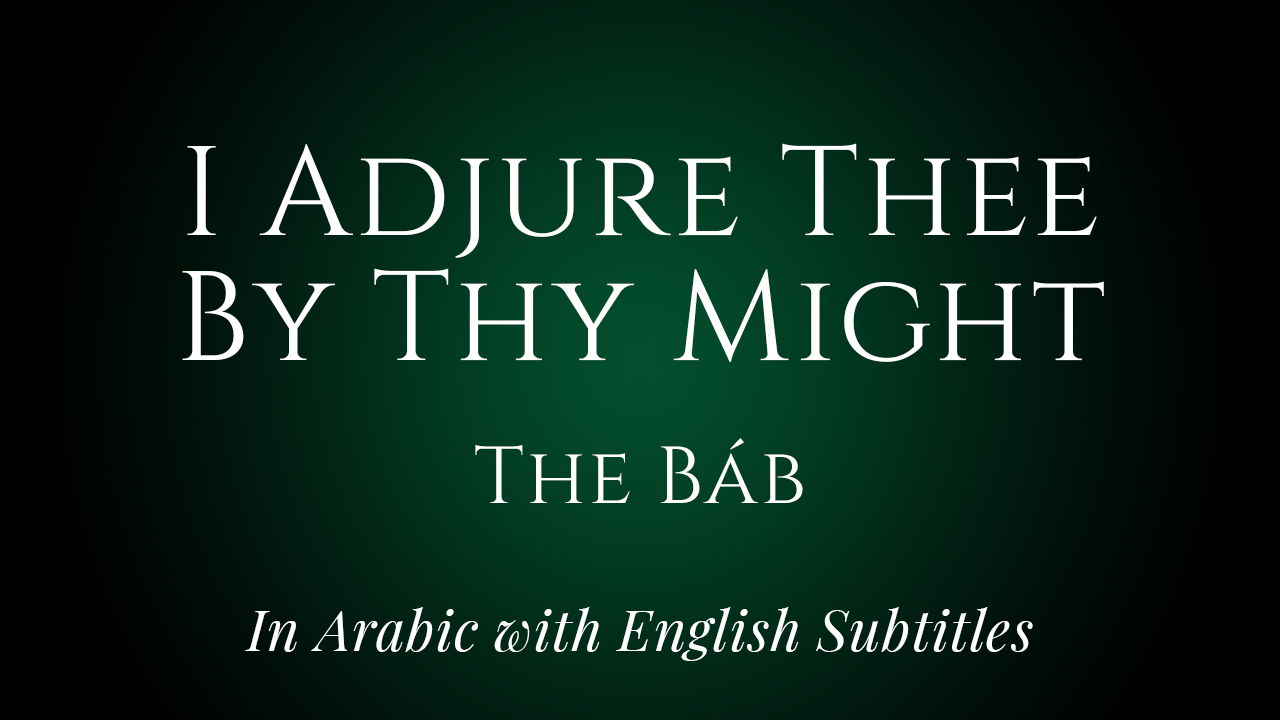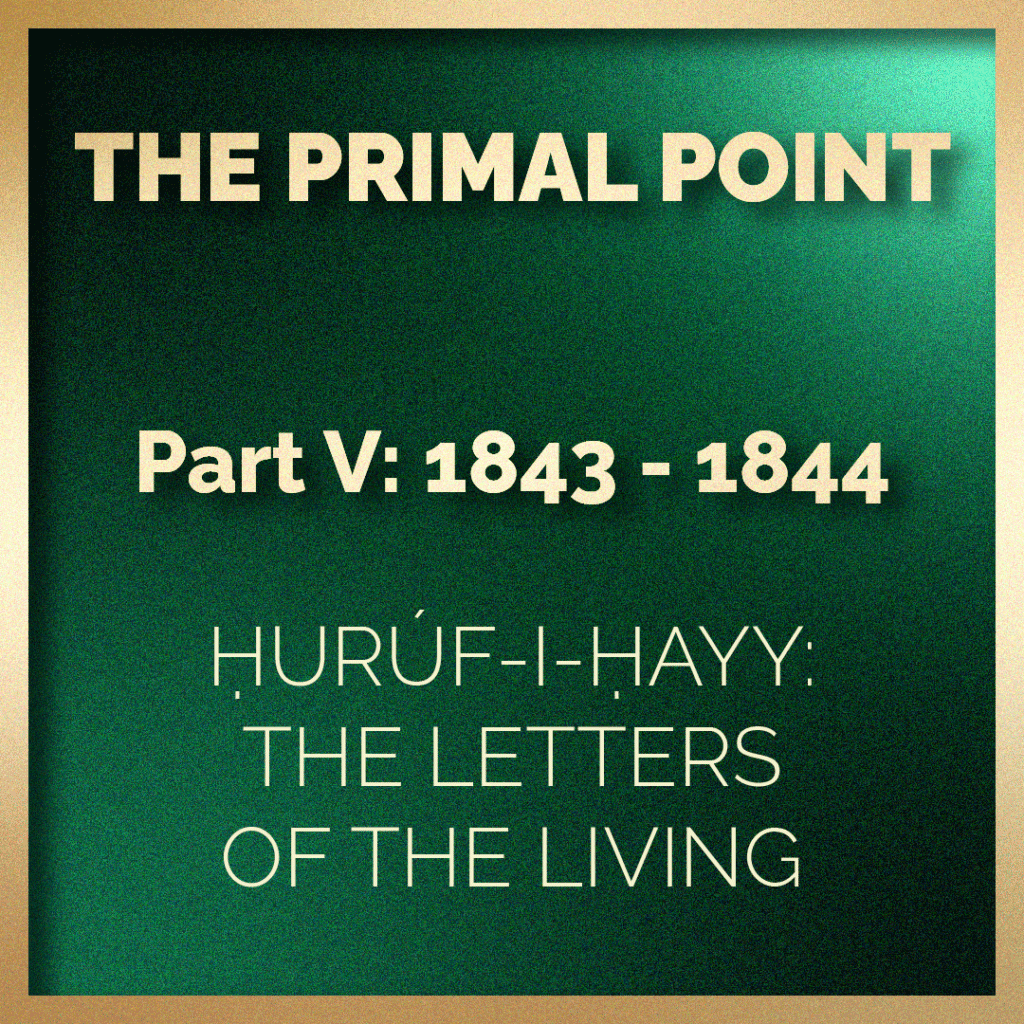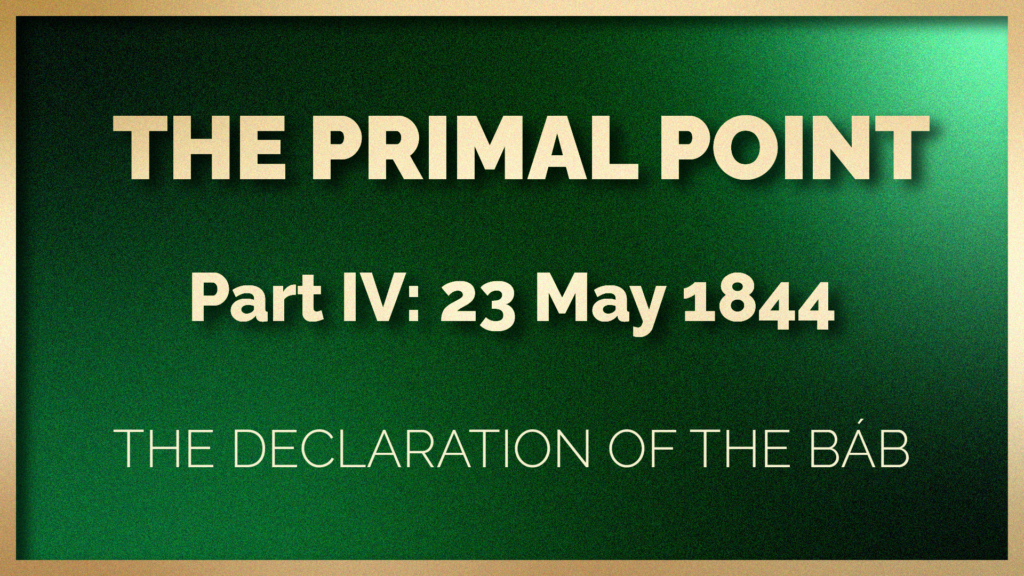
Written and illustrated by Violetta Zein
This part covers the life of the Báb at the age of 25 in 1844.
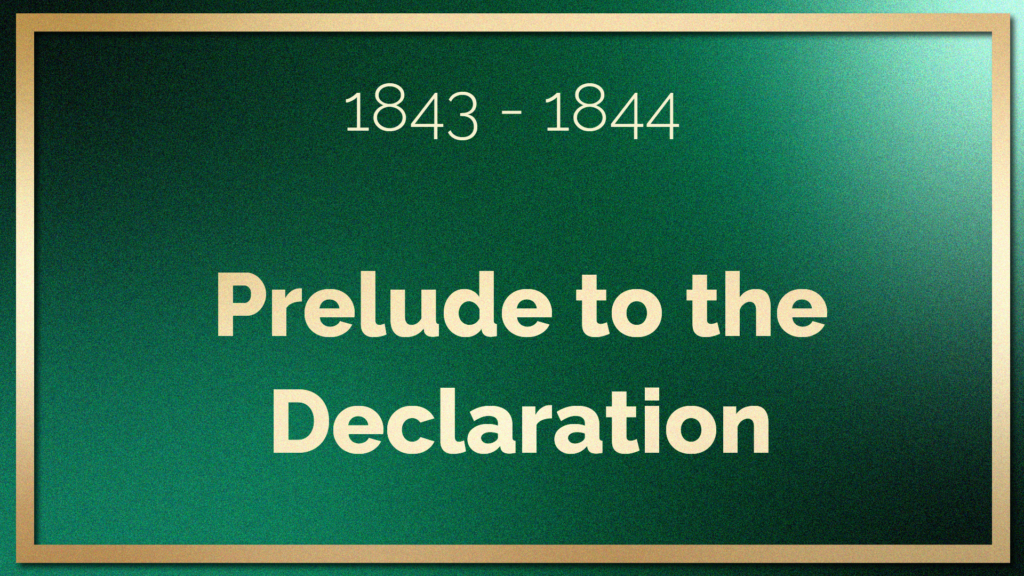
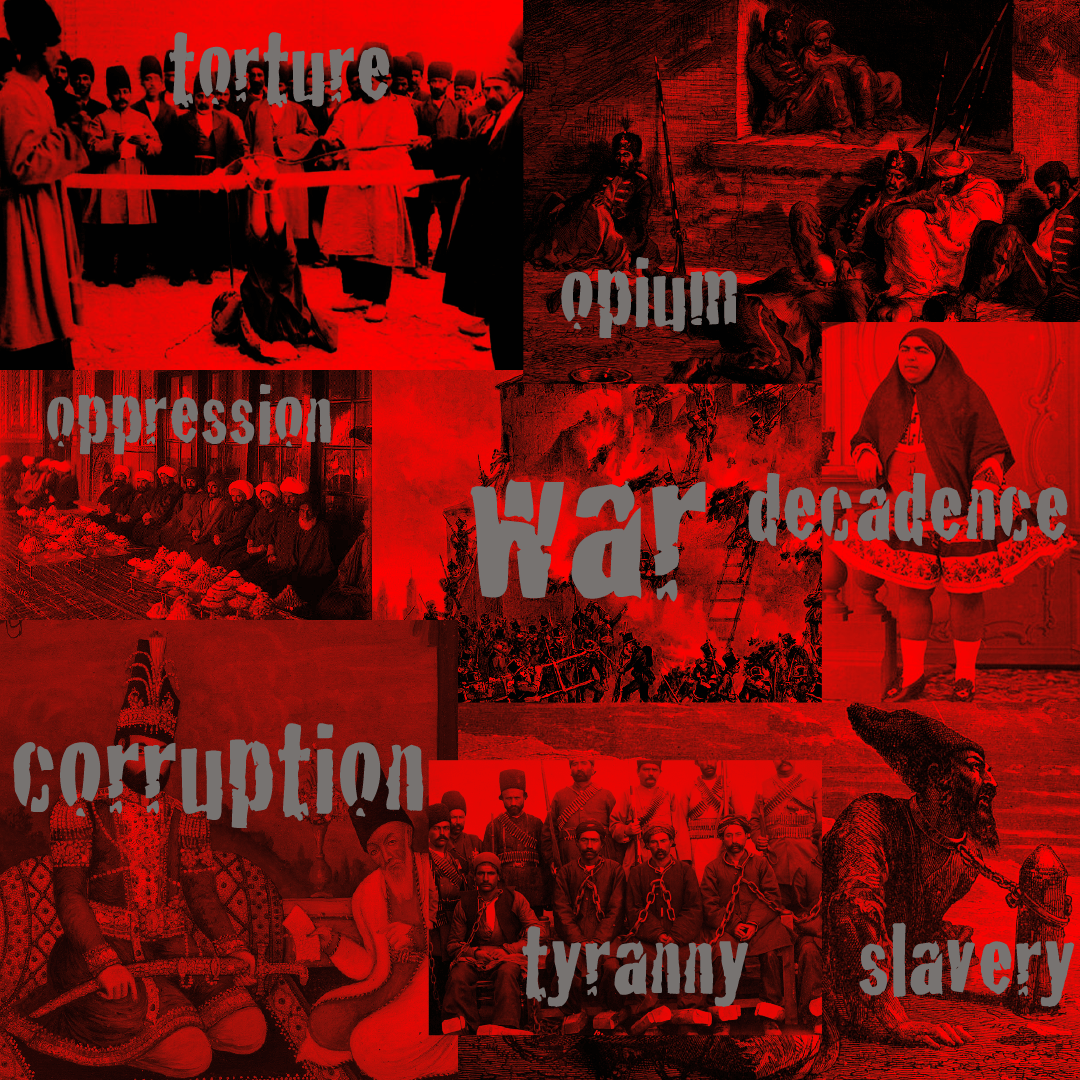
“Life support”: A photomontage of the ills plaguing Qajar Persia © Violetta Zein
The Báb was about to make His history-altering Declaration as a Son of Persia, on Persian soil, a country that had been famous for millennia for its glorious and illustrious past.
But all that was, indeed the past.
From the beginning of the 19th century, Persia, which had been in a slow decline for centuries, started declining at a vertiginous rate.
Government structures began falling apart in the 16th-17th centuries under the Ṣafavid dynasty (1501-1732), and though they revived slightly in the two following centuries, by the mid 19th century, Persia, as described by eminent historian Mr. H.M. Balyuzi, was “materially impoverished, intellectually stagnant, spiritually moribund.”
The peasants and farmers of Persia suffered appalling conditions, corruption had seeped into every aspect of the government and country and was destroying it from the inside out, tyranny and oppression were the norm, State functions and offices were bought and sold like commodities, taxes were farmed by officials, bribery and extortion had become legitimized under the euphemism “madákhil” (“Perquisites”), historic sites that had made Persia’s name were falling into ruin and were dilapidated, disease, neglect, and insecurity had drastically killed off a large percentage of the Persian population. Historic cities and buildings were falling into ruin. There were now only 10 million people left in a kingdom the size of current-day Western Europe.
Persia had paid the price, for a semi-feudal state, and it had also paid the price for the tyranny of the Shí’ah clerics who destroyed more and deeper beyond what the government and the corrupt administration had already destroyed.
By 1844, Persia was on life support.
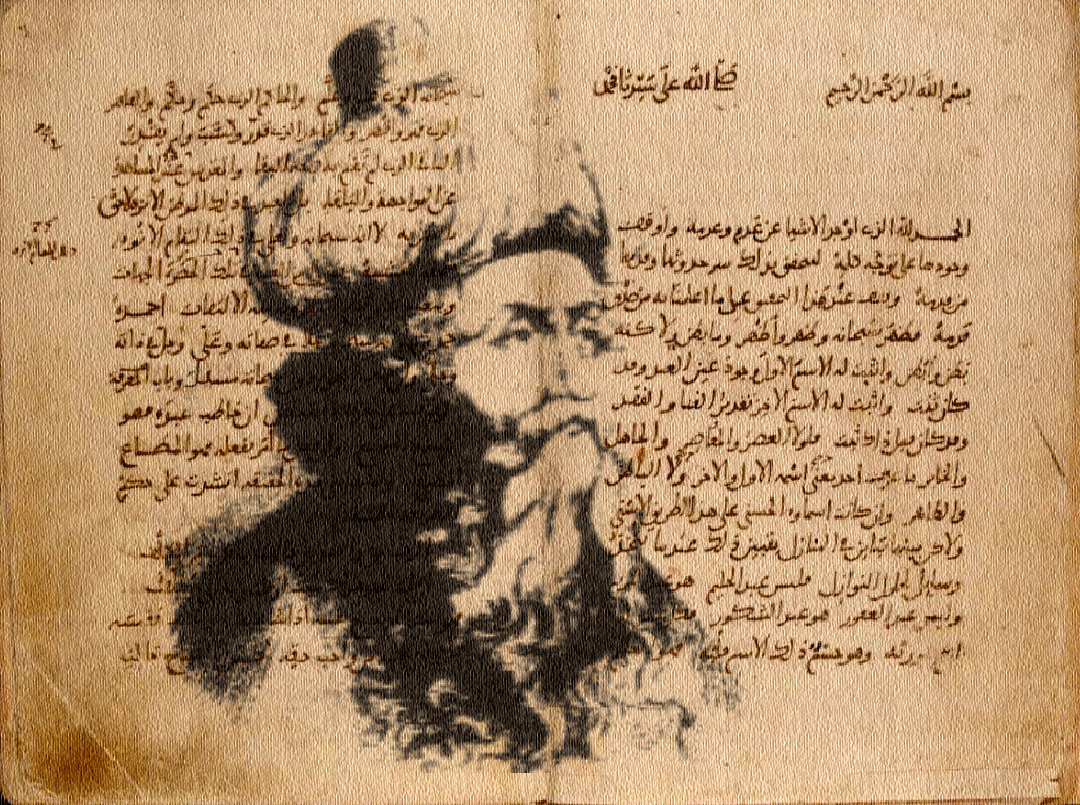
The only image of Ibn ‘Arabí we have, superimposed over the opening pages of the Konya manuscript of the Meccan Revelations, handwritten by Ibn ‘Arabí between 1203 -and 1240. The Meccan Revelations are where many of his prophecies about the Báb originate. © Violetta Zein Source of manuscript photo: Wikimedia Commons; source of drawing of Ibn ‘Arabí: Wikimedia Commons.
When the Imám Ja’far, the sixth Imám of Shí’ah Islám, was asked about the year when the Qá’im would be made manifest, he answered:
“Verily, in the year sixty His Cause shall be revealed, and His name shall be noised abroad.”
Muḥyíd-Dín-i-‘Arabí, also known as Ibn ‘Arabí, was a 7th century Arab Andalusian Muslim scholar, mystic, poet, and philosopher, extremely influential within Islamic thought. His name Muḥyíd-Dín means Reviver of Religion, and he was considered a saint by some Muslim scholars. He was prolific and wrote some 850 works.
When he was asked about the return of the Promised One, he left several prophecies among which are the following about the country of origin of the Qá’im:
“The ministers and upholders of His Faith shall be of the people of Persia.”
Ibn ‘Arabí left a prophecy about the name of the Báb, Siyyid ‘Alí Muḥammad, by giving the order of his names:
“In His name, the name of the Guardian [‘Alí] precedeth that of the Prophet [Muhammad].”
He also prophesized the year of the Báb’s Declaration, by indicating 1260 is half of 2520:
“The year of His Revelation is identical with half of that number which is divisible by nine [2520].”
Mírzá Muhammad-i-Akhbarí, an 18th century jurist and expert in Ḥadíths, was the founder of the Akhbarí school of Shí’ah law. Widely respected for his learning, he wrote poems relating to the year of the Manifestation of the promised Qá’im and made the following prediction, using the Arabic numerical value of the word “Ghars” which equals 1260 (the year 1844), to identify the year of His advent:
“In the year Ghars [the numerical value of the letters of which is 1260] the earth shall be illumined by His light, and in Gharásih [1265] the world shall be suffused with its glory. If thou livest until the year Gharasí [1270], thou shalt witness how the nations, the rulers, the peoples, and the Faith of God shall all have been renewed.”
Imám ‘Alí was the last of four Rightly Guided Caliphs to rule Islam in the 7th century immediately after the death of the Prophet Muḥammad, and he was the first Shí’ah Imám. He used the same symbolic use of the word “Ghars” to indicate the year 1260/1844, as the year of the Declaration of the Báb, in a Ḥadíth ascribed to him:
“In Ghars the Tree of Divine guidance shall be planted.”
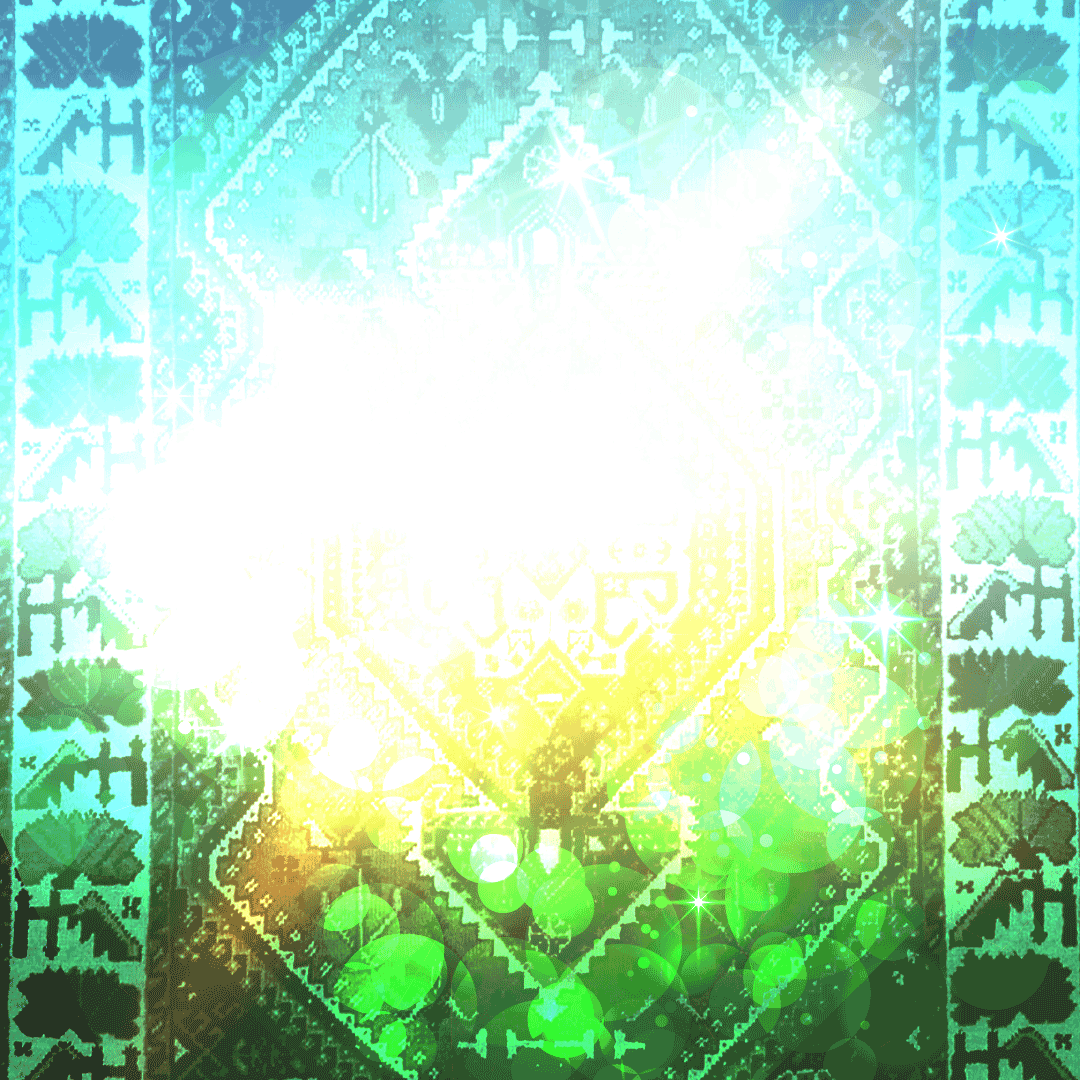
“Divine Presence”: An abstract interpretation of divine forces present in the Báb’s life with increasing intensity as the Declaration night approaches. © Violetta Zein
Sometime in the year prior to His Declaration, the Báb had a powerful spiritual dream indicating to Him that He was a Manifestation of God.
The Báb recounted this dream in a very short Tablet He revealed in 1844, known only as “Tablet revealed in the year '60”:
“The spirit of prayer which animates My soul is the direct consequence of a dream which I had in the year before the declaration of My Mission. In My vision I saw the head of the Imám Ḥusayn, the Siyyidu’sh-Shuhada’ (Prince of Martyrs), which was hanging upon a tree. Drops of blood dripped profusely from His lacerated throat. With feelings of unsurpassed delight, I approached that tree and, stretching forth My hands, gathered a few drops of that sacred blood, and drank them devoutly. When I awoke, I felt that the Spirit of God had permeated and taken possession of My soul. My heart was thrilled with the joy of His Divine presence, and the mysteries of His Revelation were unfolded before My eyes in all their glory.”
Partial Inventory ID: BB00605

“Am I not your Lord”: A visual homage to Ṭáhirih’s spiritual preparation for the advent of the Promised One © Violetta Zein
Ṭáhirih had become a follower of Siyyid Káẓim at some point during the 13 years she had lived in Karbilá with her husband, between 1828 and 1841. When she returned to Qazvín, her conversion to Shaykhism was a source of tension and conflict with her family.
In 1843, two years after coming home to Qazvín, she returned to 'Iráq with her sister and brother-in-law, Marḍíyyih and her husband Mírzá Muḥammad-‘Alíy-i-Qazvíní. Ṭáhirih had told her family they were going to the ‘Atabát, but her real purpose was to meet Siyyid Káẓim.
Tragically, Ṭáhirih arrived in Karbilá ten days after Siyyid Káẓim’s passing. She formed a strong bond with Siyyid Káẓim’s widow, and lived in their home. Soon, Ṭáhirih took up the mantle of her former teacher and began teaching classes in his home, with the blessing of his widow, who provided Ṭáhirih with Siyyid Káẓim’s unpublished manuscripts.
Ṭáhirih continued to prepare Siyyid Káẓim’s disciples for the imminent Advent of the Promised One, Her teaching was deeply effective, and she gained both a wide and popular following. In obedience to Siyyid Káẓim’s instructions, Ṭáhirih spent time in prayer, fasting and meditation, until one night, she dreamt of a youth, a Siyyid in a black cloak and a green turban floating in the air and reciting verses, praying with His hands raised up. Ṭáhirih wrote down the verses immediately as soon as she awoke. No one so far has been able to identify which verses these were.
When Ṭáhirih later learned that her brother-i-law, Mírzá Muḥammad-‘Alíy-i-Qazvíní was about to leave Karbilá in search for the Promised One, she gave him a sealed letter to give to the Qá’im, and asked him to deliver a verbal message in the form of a poem on her behalf.
The first part of the message was:
“The effulgence of Thy face flashed forth, and the rays of Thy visage arose on high.”
After this, Ṭáhirih asked Mírzá Muḥammad-‘Alí to speak the following words:
“Am I not your Lord?” and “Thou art, Thou art!” we will all reply.’”
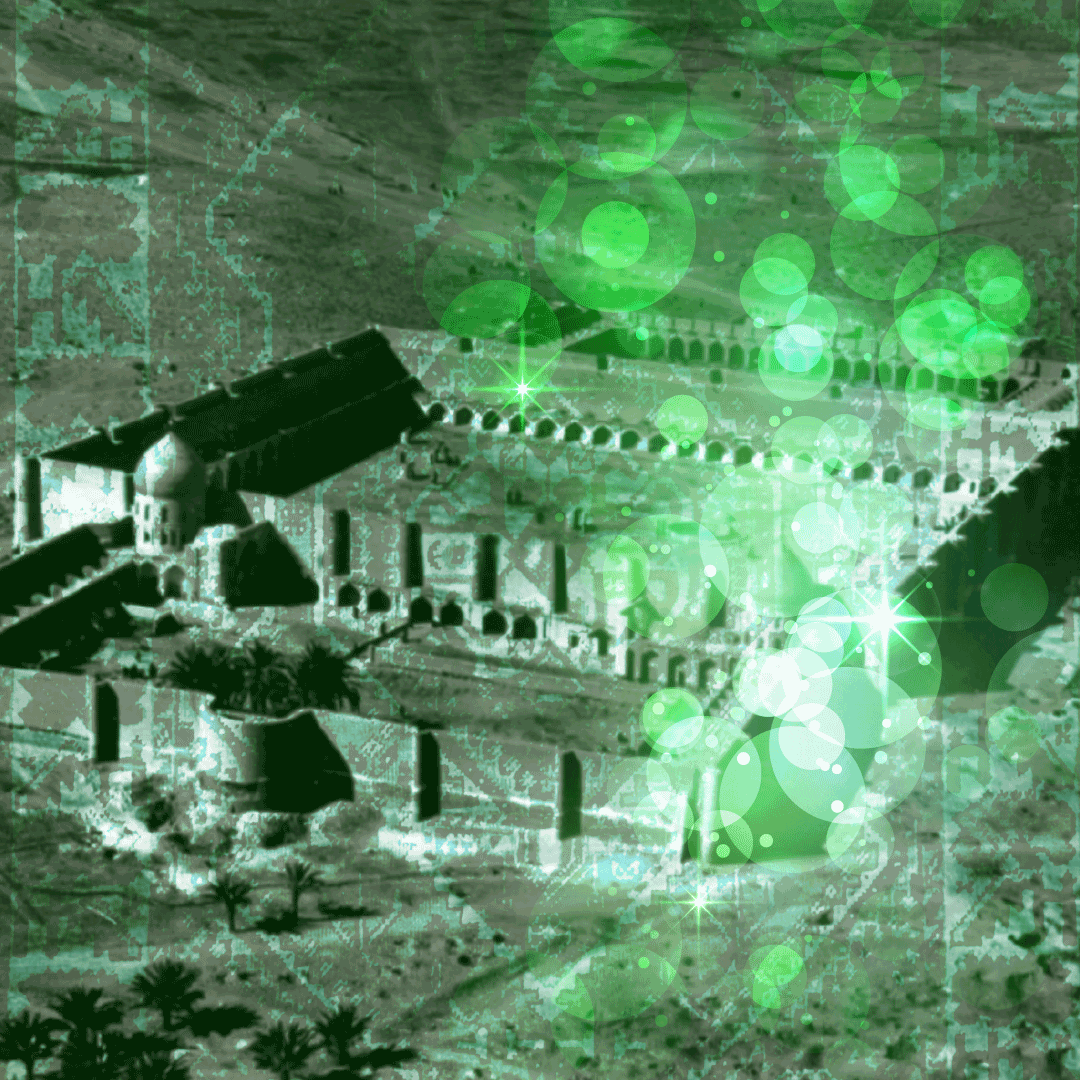
“The quest”: A visual homage to Mullá Ḥusayn’s ardent search for the Promised One, beginning with a 40-day retirement in the Masjid-i-Kúfih. © Violetta Zein
Mullá Ḥusayn-i- Bushrú’í was Siyyid Káẓim’s most faithful disciple. He was in his thirties, and possessed two great attributes: a profound scholarship and an unbending will, but it was his spirit that made him stand apart from the rest of Siyyid Káẓim’s disciples.
He had an unquenchable thirst for learning, and never rested. He was a man of intense determination, always looking for a new challenge, and was so knowledgeable about the Shaykhí teachings that it was widely expected that he would succeed Siyyid Káẓim-i-Rashtí.
Sometime in 1843, Siyyid Káẓim had sent Mullá Ḥusayn on a mission to Persia, and he returned to Karbilá on 22 January 1844, having successfully completed his task, only to find he had arrived nearly three weeks after his beloved teacher’s death.
Mullá Ḥusayn returned to Karbilá eleven or twelve days after Ṭáhirih had arrived and she had taken over teaching classes in the home of Siyyid Káẓim.
After receiving three days of continuous visits from mourners for Siyyid Káẓim, Mullá Ḥusayn gathered his teacher’s leading disciples and enquired after Siyyid Káẓim’s last wishes.
They unanimously reported that Siyyid Káẓim had given them clear instructions:
“The Object of our quest was now revealed. The veils that intervened between you and Him are such as only you can remove by your devoted search. Nothing short of prayerful endeavour, of purity of motive, of singleness of mind, will enable you to tear them asunder. Has not God revealed in His Book: ‘Whoso maketh efforts for Us, in Our ways will We guide them’?”
Mullá Ḥusayn reprimanded his fellow students, who claimed they were ready to accept him as the Promised One, telling them:
“Your first obligation, as well as mine, is to arise and carry out, both in the spirit and in the letter, the dying message of our beloved chief.”
Mullá Ḥusayn tried and failed to rouse his fellow-students to leave their home and seek out the Promised One. He left Karbilá, accompanied by his brother and nephew, both barely 20 years old, and who had been at his side since he left Persia.
On 22 February 1844, Mullá Ḥusayn and his brother and nephew went to the Masjid-i-Kúfih, an old but important mosque nearly in ruins, outside of Karbilá, where they spent 40 days in prayer and meditation, spiritually preparing themselves for their important quest.
In April 1844, when Mullá Ḥusayn ended his retirement, he left for Najáf with his brother and his nephew, and headed southeast to the Persian Gulf, where he boarded a boat bound for Búshihr in Persia. Mullá Ḥusayn soon left the port city, drawn, as if by a magnet, north towards Shíráz.
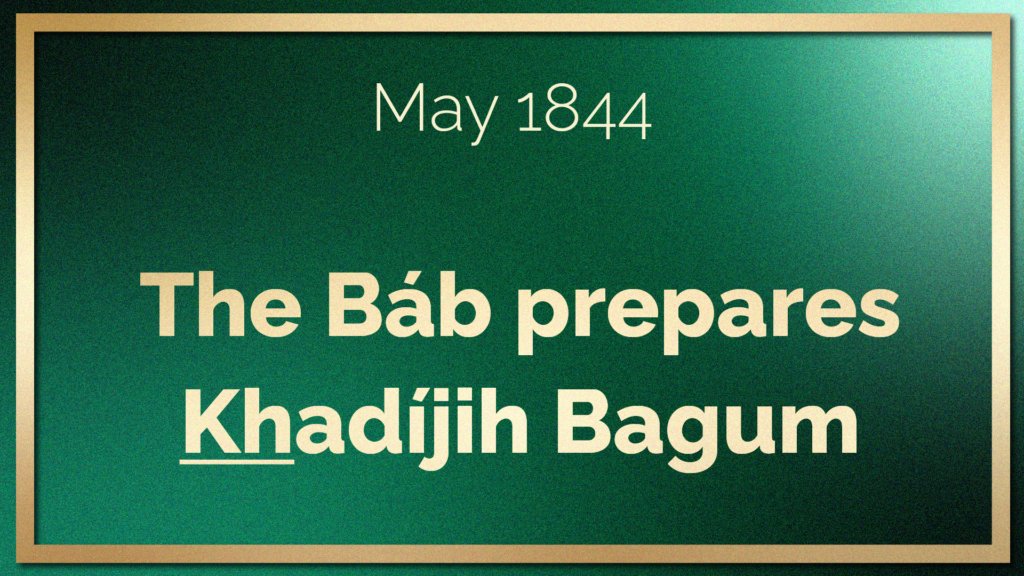
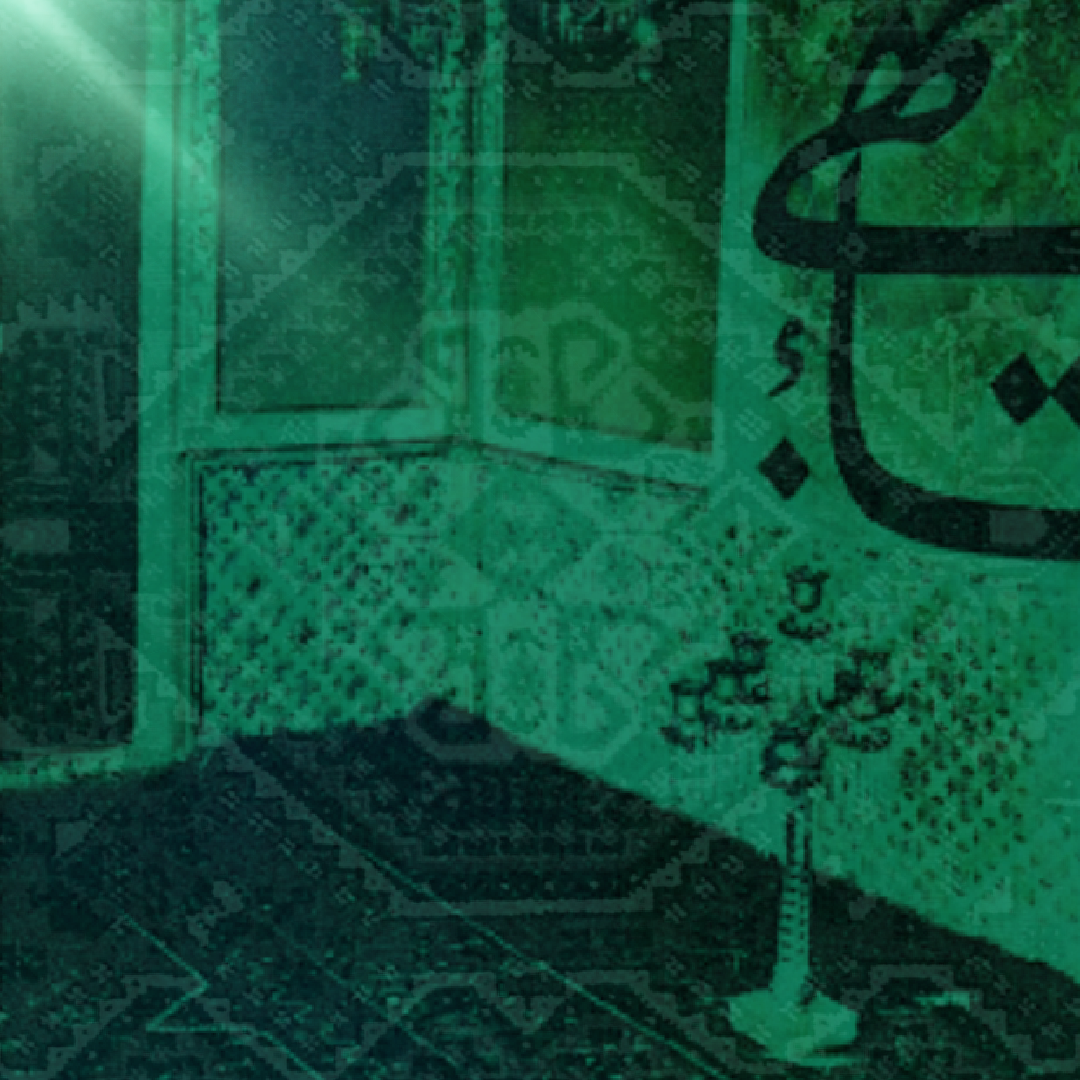
“Evening meal”: digital painting of the room of Fáṭimih Bagum, where the Báb and Khadíjih Bagum had an unusually early dinner, one night in May 1844. Original image: Nabil, The Dawn-Breakers, page 60.
In the Ṣaḥífiy-i-Bayna’l-Ḥaramayn (The Epistle between the Two Shrines), the Báb specifically dates the first Revelation He received:
“In truth, the first day that the spirit descended in the heart of this servant was the fifteenth of the month of Rabiʻu’l-Avval [4 April 1844].”
This story of Khadíjih Bagum witnessing the Báb receiving the descent of the spirit therefore occurred either on 4 April 1844, or on a night between 4 April 1844 and 22 May 1844.
One day, before 22 May 1844, the Báb returned home at dusk, earlier than usual, and He told Khadíjih Bagum:
"Tell Fiḍḍih to prepare whatever we are having for the evening meal sooner than usual. Tonight I have a particular task to attend to."
Fiḍḍih was informed, and about an hour and half later, the family ate dinner in Fáṭimih Bagum’s room. Then, Fiḍḍih brought the Báb some water for Him to wash His hands, spread out their bedding, and returned to her own quarters.
The Báb then retired for the night.
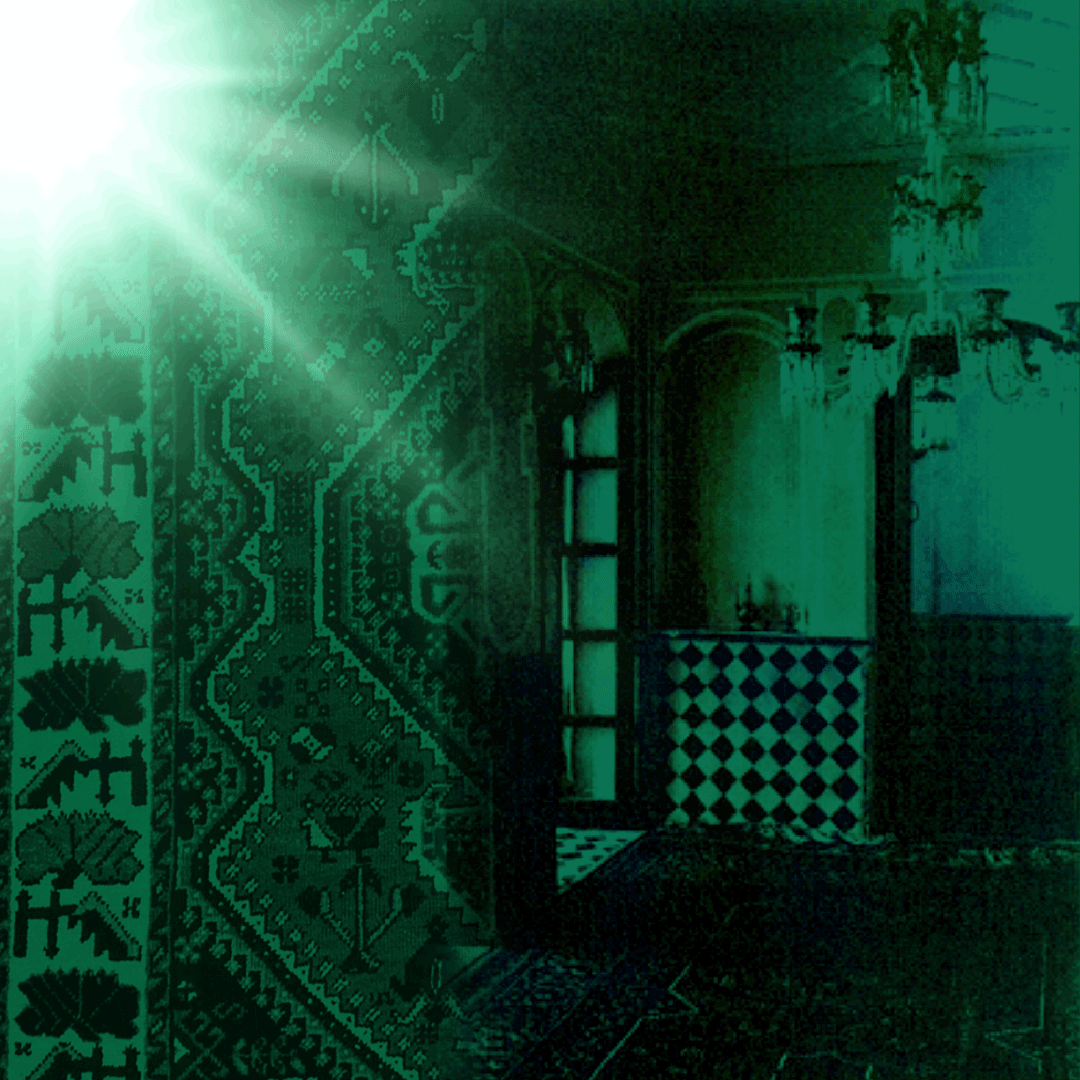
“Searching”: Digital painting of the search of Khadíjih Bagum for the Báb, late one night in May 1844, the image on the right is the Báb’s bed chamber. © Violetta Zein Original image: Nabil, The Dawn-Breakers, page 60.
Around midnight, when the house was quiet and everyone had gone to sleep, the Báb rose from bed and left the room. At first, Khadíjih Bagum was not worried, but when the Báb had not returned after more than an hour, she became concerned and went out to look for Him.
She looked in the lavatory, checked the bedroom of Fáṭimih Bagum, then, thinking that, for some reason, He had left the house, she checked the street door but she found it locked, which meant He was still in the house somewhere.
The Báb was nowhere to be found.
Khadíjih Bagum walked to the western side of the house, and looking at the rooftop, she saw the upper chamber on the eastern side of the house was bathed in light, which caught her by surprise. It looked like the chamber was illuminated with a thousand lamps.
She had never seen the Báb go to that part of the house at that hour of the night, unless He was entertaining guests, and when He did, He always told her to expect a visitor, which He had not done that evening.
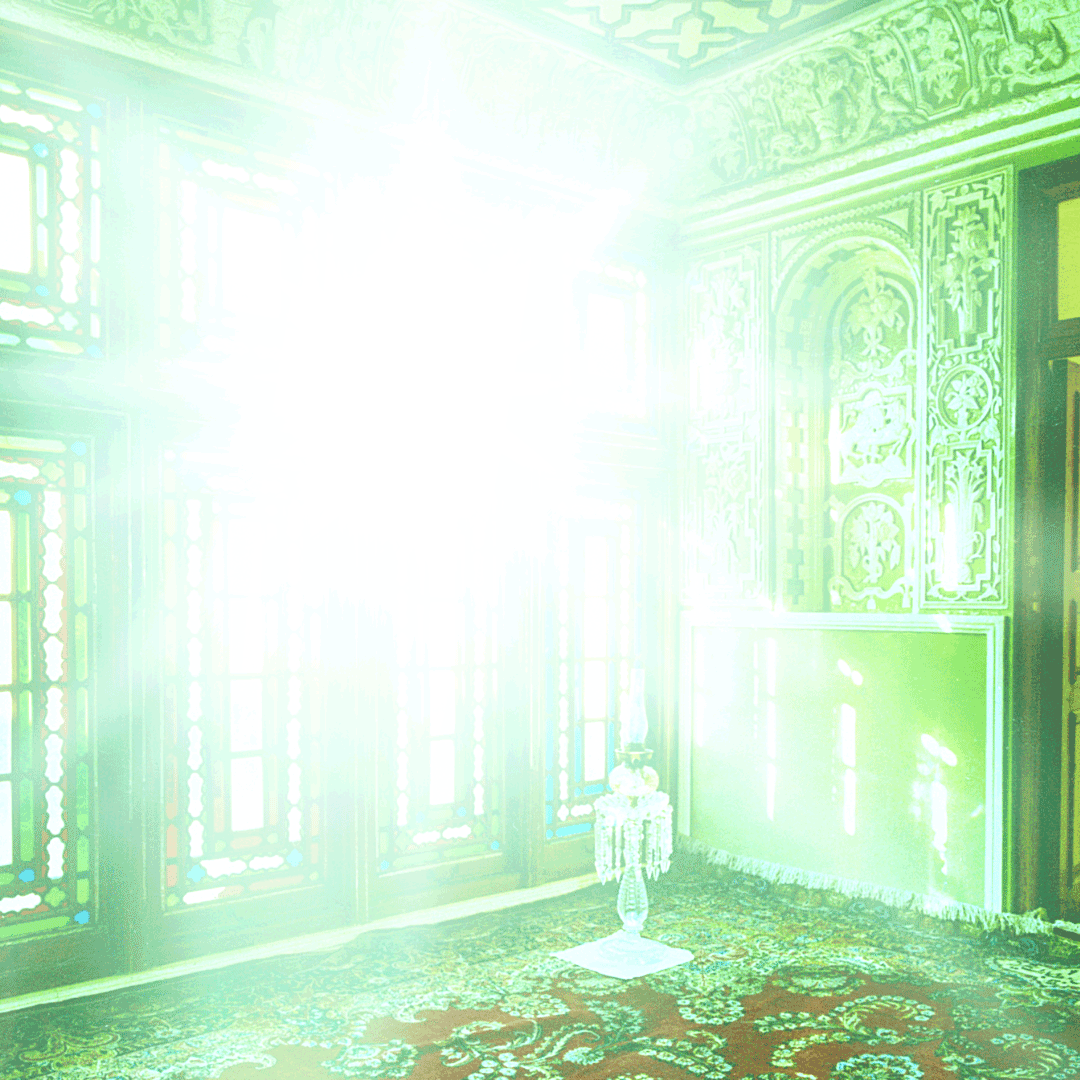
“Transfiguration”: Artistic interpretation of the thousand lights blinding Khadíjih Bagum as she sees the Báb in a state of transfiguration. © Violetta Zein Original image of the room in which the Báb would later make His Declaration: Bahá'í Media Bank, © Bahá'í International Community 2023.
Utterly astonished and at the same time apprehensive, Khadíjih Bagum went up the stairs at the northern side of the courtyard which led to the room, and when she entered, she found the room was lit so brilliantly that it dazzled her eyes, but there was only a single lamp.
Then, she saw her Husband standing in the chamber, facing the Qiblih, His hands raised heavenwards, intoning a prayer in the most melodious voice, tears streaming down His face.
Khadíjih Bagum saw the Báb, standing with an air of indescribable majesty and resplendence. Her Husband’s face illumined, rays of lights radiating from it. As Khadíjih Bagum stood, transfixed, staring at this heavenly Being, she was seized with awe and began shaking uncontrollably. She found she could no longer move and that her willpower had abandoned her.
She couldn’t enter the chamber, she couldn’t go back down the stairs, and she felt like she was on the verge of losing consciousness, when the Báb made a gesture with His hand and spoke to her:
“Go back.”
That simple movement of His hands released Khadíjih Bagum from the state she was in, and she went back down in the house, returned to her room and went to bed. She was so affected by what she had just seen that remained deeply disturbed, and spent a sleepless night, visualizing the scene over and over again in her mind. She kept asking herself what could possibly have happened that would have caused such tears to flow down His face, and prompted such heartrending prayers and supplications.
That night, which had already changed her life forever, she communed with God, saying:
“O my God, what power and grandeur! What greatness and glory! What is the wisdom in your revealing to me that effulgent Sun? Is He my Siyyid ‘Alí-Muhammad? Will I henceforth be able to live with that luminous Sun? Nay, nay, the rays of this Resplendent Sun will consume me, and will reduce me to ashes. I possess not the power to withstand it.”
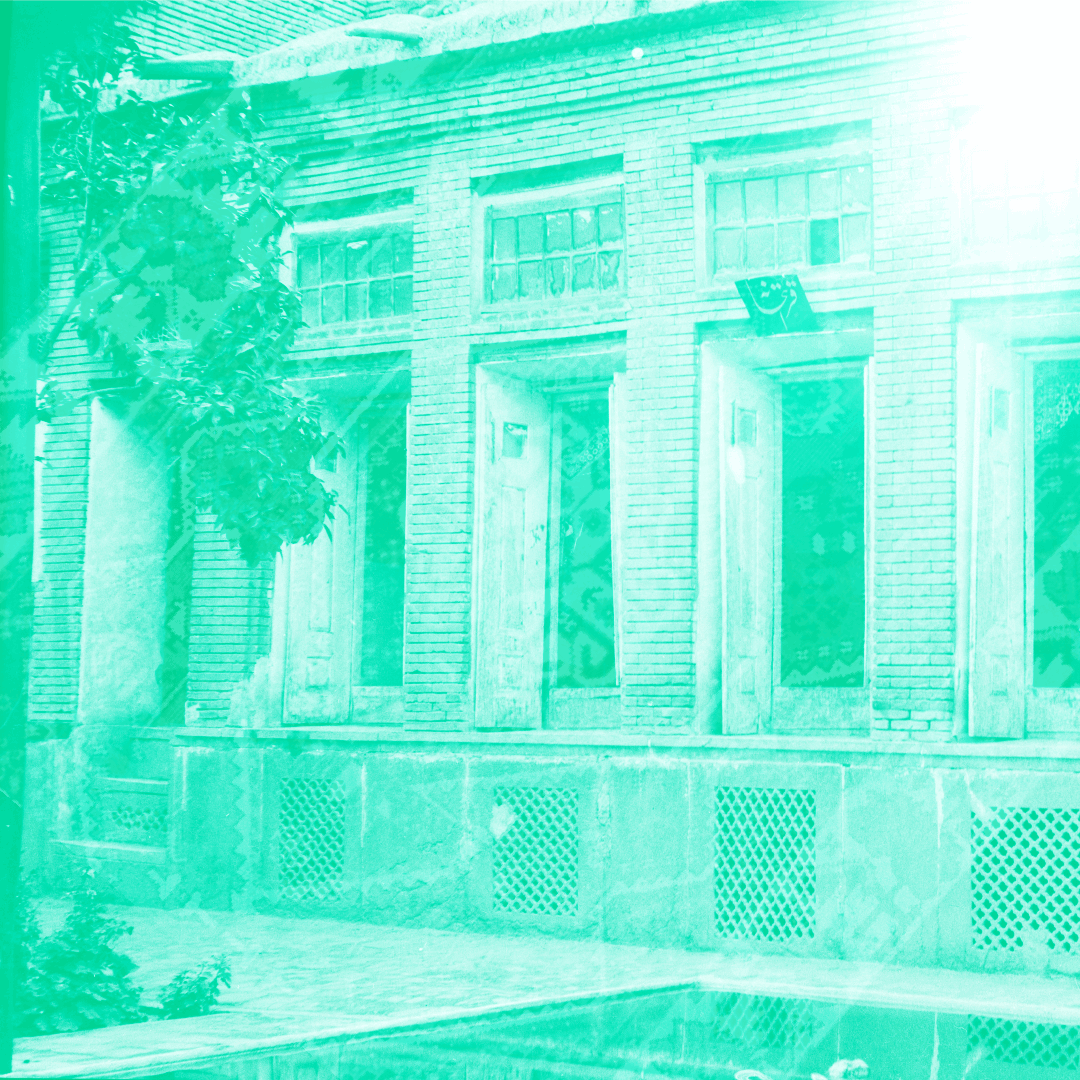
“Acceptance”: A peaceful rendering of the exterior of the house of the Báb, the morning after Khadíjih Bagum discovers her Husband is the Promised One of Islám. Original image: Bahá'í Media Bank, © Bahá'í International Community 2023.
Khadíjih Bagum was filled with anxiety when dawn finally broke, and she heard the muezzin’s call to prayer sounded from the mosque adjacent to their house. Fiḍḍih brought the samovar and tea-things into Fáṭimih Bagum’s room, and as usual, they went into His mother’s room for His morning tea.
Khadíjih Bagum followed the Báb inside. Fáṭimih Bagum had stepped out of her room at that moment, and the Báb and Khadíjih Bagum were alone. As soon as her eyes fell on her Husband, she saw that same attitude and majesty she had witnessed the night before.
She grew pale and shivered involuntarily. The Báb was quietly drinking His tea, and raised His face towards His wife with great kindness and affection, and asked her to take a seat, then gave her the rest of the tea in His own cup, which she drank. His kindness to her restored Khadíjih Bagum’s courage.
When the Báb asked her what was troubling her, Khadíjih Bagum courageously replied that it was the change in him that weighed so heavily on her mind:
"You are no longer the same person I knew in our childhood. We grew up together, we have been married for two years, living in this house, and now I see a different person before me. You have been transformed."
Khadíjih Bagum added that this made her feel anxious and uncomfortable. The Báb smiled and said that, although it had not been His wish for her to see Him in the state He had been in the night before, God had decided otherwise, telling Khadíjih Bagum the entire truth about His station, before His official Declaration to Mullá Ḥusayn:
"It was the will of God that you should have seen Me in the way you did last night, so that no shadow of doubt should ever cross your mind, and you should come to know with absolute certitude that I am that Manifestation of God Whose advent has been expected for a thousand years. This light radiates from My heart and from My Being."
Khadíjih Bagum herself described the state of her soul upon hearing these words:
“As soon as I heard Him speak these words I believed in Him. I prostrated myself before Him and my heart became calm and assured. From that moment I lived only to serve Him, evanescent and self-effacing before Him, no thought of self ever intruding.”
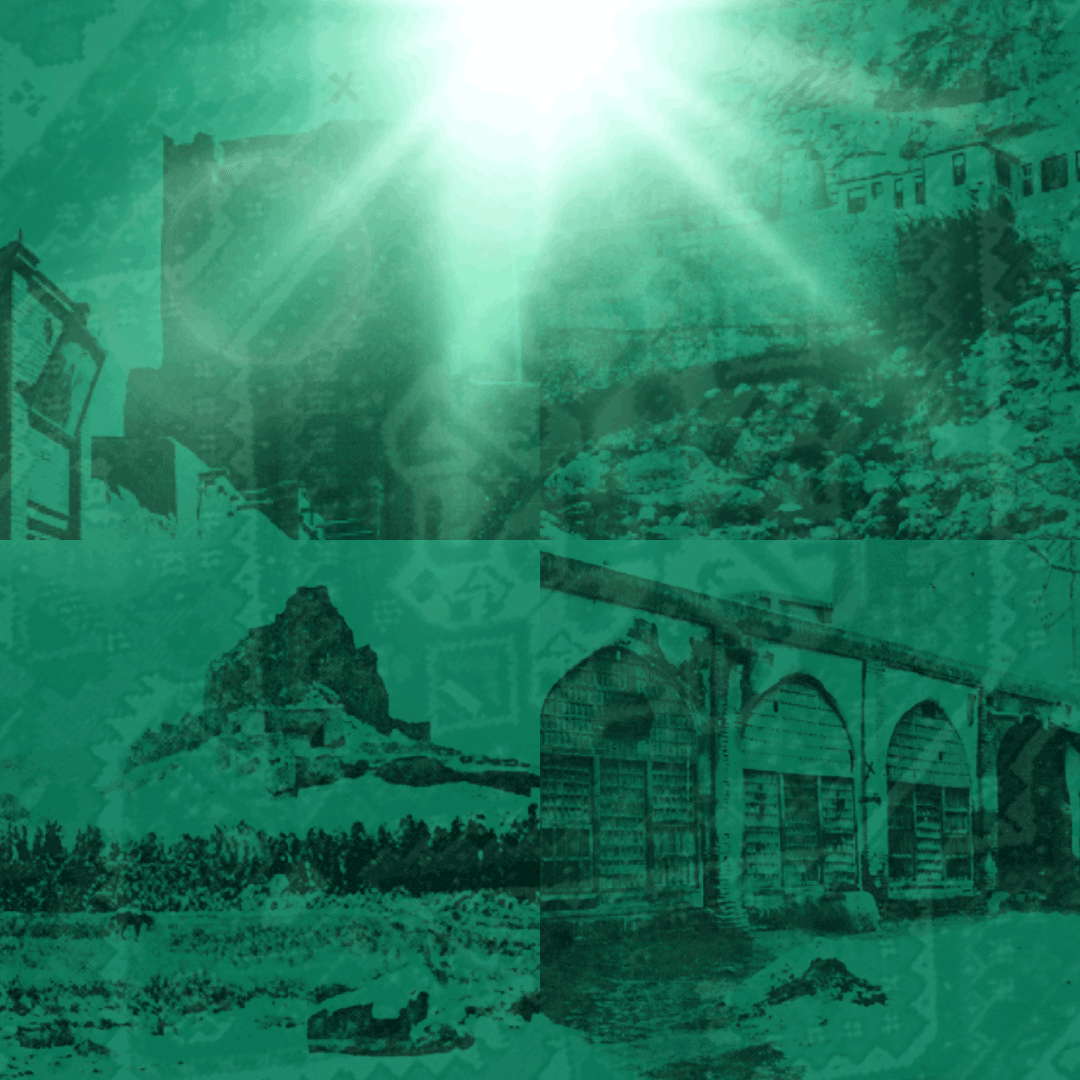
“Sufferings”: An homage to the future sufferings of the Báb in Tabríz, Máh-Kú, and Chihríq. In the story below the Báb prepares Khadíjih Bagum for His future trials. All original images from Nabil, The Dawn-Breakers. © Violetta Zein
Khadíjih Bagum stands alone with Ṭáhirih among all the women of her generation in their instant, radiant, and complete acceptance of the Báb’s station.
For years, in dreams and in life, Khadíjih Bagum had been certain of the great destiny of the Báb. As the time for His Declaration approached, the Báb was receiving Revelation, which transfigured His very being.
At this moment, so close to the Báb’s imminent Declaration, Khadíjih Bagum became increasingly aware of her Husband’s spiritual power but she was unaware of the exact nature of His claim and mission.
The Báb confided the secret of His future sufferings to Khadíjih Bagum. He unfolded to her eyes the significance of the events that would soon begin to take place in Persia, but asked her not to share this with His mother.
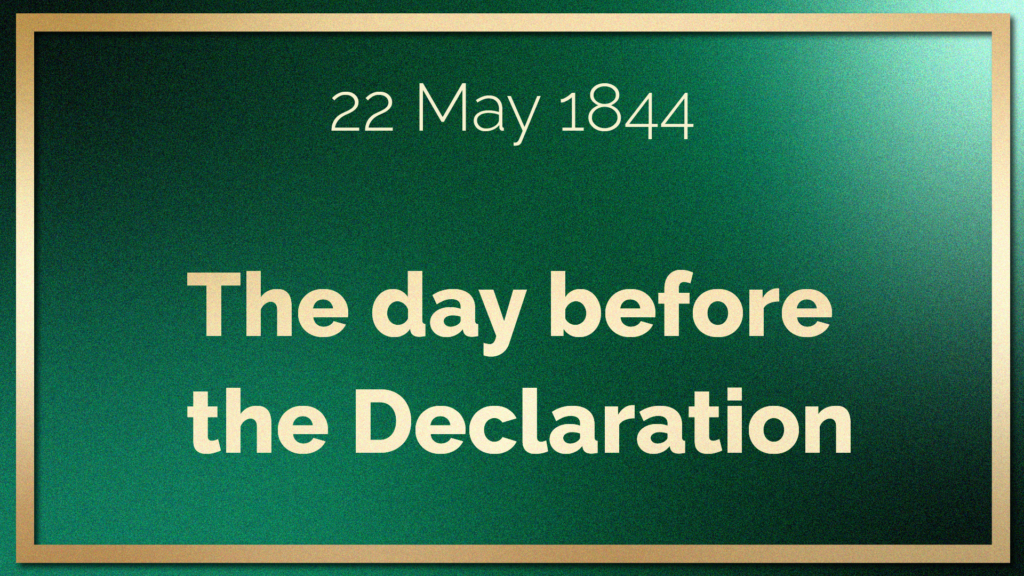

“History”: A blend of Persia’s ancient past and Iran’s present in ancient engravings and news pictures, over two maps, a 17th century map of Persia and a , to symbolize an ever-evolving historical understanding of past events. © Violetta Zein
Hand of the Cause Ḥasan M. Balyuzi tells a story on page 8 of “Eminent Bahá'ís in the time of Bahá'u'lláh” of the Báb in Karbilá hearing Mullá Ḥusayn recite lines from a poem by Shaykh Aḥmad-i-Aḥsá’í at the request of Siyyid Káẓim, an event which caused the Báb to weep so deeply that the entire gathering was affected.
This story is also quoted in Fereydun Vahman (Editor),”The Báb and the Bábí Community of Iran” (2020), “Chapter 1: The Báb: A Sun in a Night Not Followed by Dawn.”
In the same book on page 166, Dr. Amanat states that Mullá Ḥusayn must have arrived in Shíráz in mid-May 1844, not on 22 May 1844 and states that it is likely the Báb knew of Mullá Ḥusayn’s arrival beforehand, which he considers as indicating that the Báb and Mullá Ḥusayn were acquainted prior to the night of the Declaration.
Still in Resurrection and Renewal, on page 169, Dr. Amanat quotes Mullá Ḥusayn speaking to Mullá Muḥammad Ḥasan Bushrú’í, one of the few survivors of Shaykh Ṭabarsí and stating that his interviews with the Báb took place over three nights, not in the course of the single night of 22-23 May 1844.
Dr. Amanat quotes Mullá Ḥusayn’s words, related by his sister who heard them from Mullá Muḥammad Ḥasan Bushrú’í:
“I wish my steps had never reached the madrasa, so I would never have bothered the Proof of God [the Báb]for three days and nights.”
For the purposes of this chronology, the story is told according to Nabíl’s timeline in the Dawn-Breakers, a version which was approved by Bahá'u'lláh and confirmed by Shoghi Effendi.

An ink drawing of the house of the Báb in Shíráz which was destroyed in 1979. Source: A Most Dramatic Chapter in the Spiritual History of Humankind: A Pictorial Essay by Julio Savi published in Bahá'í World 2020-05.
Before Mullá Ḥusayn even came to the Báb’s door on the evening of 22 May 1844, the Báb had prepared Khadíjih Bagum for the momentous occasion of His Revelation.
His entire being was ablaze when He told His wife:
“Tonight we will entertain a dear guest.”
Khadíjih Bagum was deeply eager to hear what the Báb had to say to His guest, but He turned to her and said:
“It is better if you go and sleep.”
Khadíjih Bagum obeyed the Báb, but she would not be able to sleep. We will read about her experience of the night of the Declaration, which she called “extraordinary,” later in this part.

A field outside of Shíráz. Source: Wikimedia Commons.
On the afternoon of 22 May 1844, when Mullá Ḥusayn finally stood at the gates of Shíráz, he told his brother and nephew to go find lodgings for them at the Masjid-i-Ílkhání, and wait there for his return. Mullá Ḥusayn stayed behind and spent time alone walking in the fields outside of the city.
His mind was preoccupied with the object of his long, arduous quest. In search of the Promised One, Mullá Ḥusayn had sailed the Persian gulf, crossed the Zagros mountains northwards from Búshihr, and traversed Alláh-u-Akbar (God is the Greatest), perhaps the greatest mountain pass in of all of Persia.
Mullá Ḥusayn now stood in the glorious, famed city of Shíráz, the home and resting place of the two of the greatest Persian poets of all time, Ḥáfiẓ and Sa’dí.
It was a hot afternoon, and Mullá Ḥusayn was exhausted from the trying journey up the coast from Búshihr through the dangerous heights of the rising plateau, but his mind was sharp and his soul yearned to reach its spiritual goal.
As Mullá Ḥusayn kept walking and reflecting, he came face to face with a striking Youth wearing a green turban, the sign of a Siyyid, a direct descendent of the Prophet Muḥammad.
This young Man was gentle and gracious and greeted Mullá Ḥusayn with great kindness and a welcoming smile. Mullá Ḥusayn soon found himself being embraced as though they were intimate, lifelong friends, and thought the Báb must be one of Siyyid Káẓim’s disciples who had heard of his arrival.
Mullá Ḥusayn was overwhelmed by such a warm and unexpected welcome but it was the dignity of the young Man’s bearing and His perfect courtesy that impressed him more than anything.
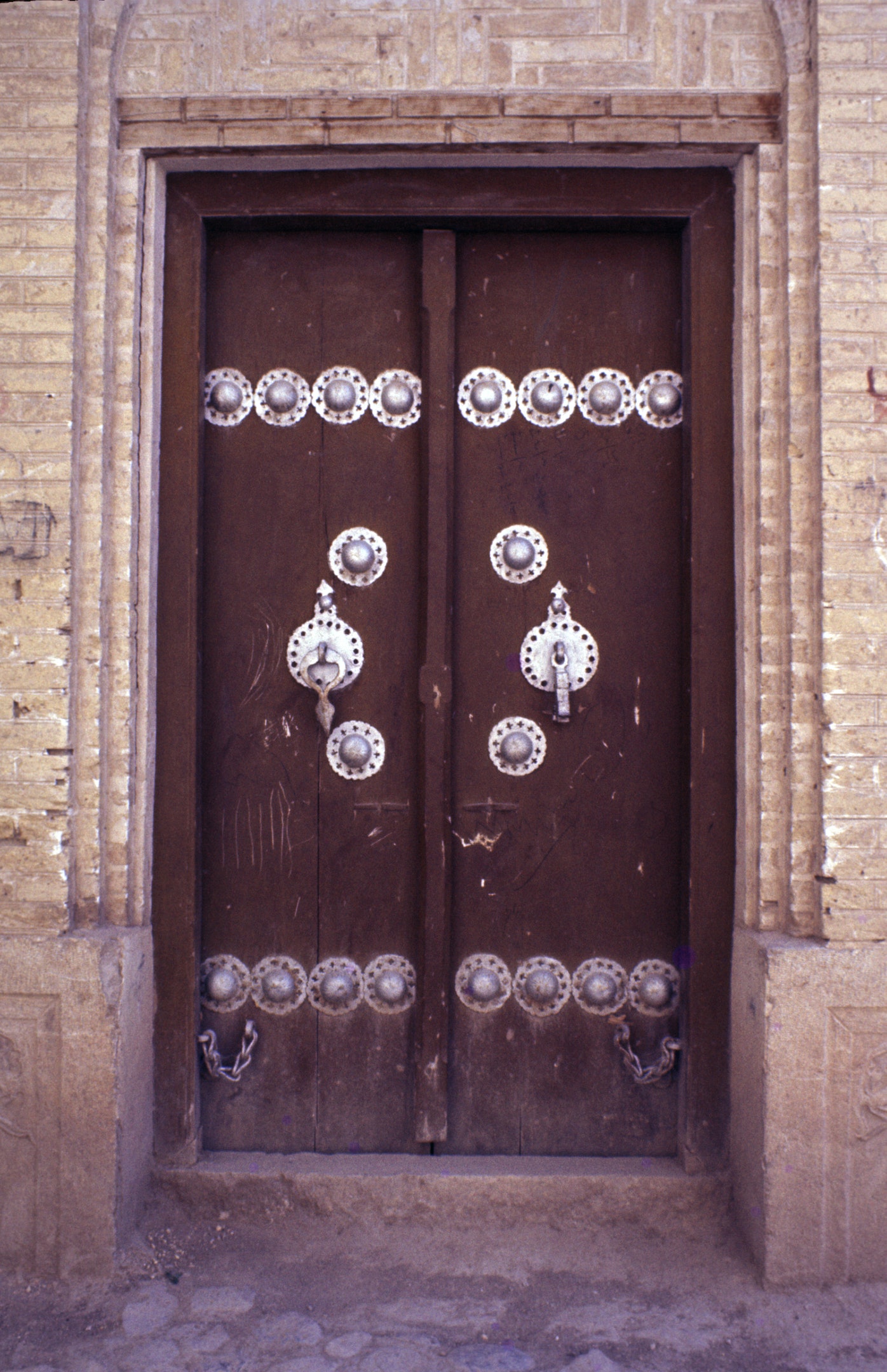
The front door of the house of the Báb in Shíráz through which Mullá Ḥusayn entered on the afternoon of 22 May 1844. Source: Bahá'í Media Bank, © Bahá'í International Community 2023.
The young Man invited him to be His guest for dinner that night at His home, and Mullá Ḥusayn explained that he had left his brother and nephew behind, but the young Siyyid replied:
“Commit them to the care of God; He will surely protect and watch over them.”
They arrived at the gate of a modest home, and after knocking on the door, Ḥájí Mubárak, the Báb’s Ethiopian servant, let them in. The Báb crossed the threshold and invited Mullá Ḥusayn in, with penetrating power and majesty as He uttered these words:
“Enter therein in peace, secure.”
The Báb motioned for Mullá Ḥusayn to follow him inside.
Shíráz had already cast its spell on Mullá Ḥusayn. He had been deeply moved upon arriving in Shíráz, and the atmosphere of the city had made a great impression on him, but the way in which the Báb had uttered His invitation struck Mullá Ḥusayn deep into his very soul.
He thought it boded well for his most important mission in this city if he was welcomed with such meaningful words as he crossed the first threshold of the first house he was entering in Shíráz.
When crossing the threshold of His house, Mullá Ḥusayn had no reason to suspect that the young Siyyid, was the Promised One, the Lord of the Age, the Qá’im of the House of Muḥammad he was searching for, but he had an intuition that this encounter would somehow bring him closer to the end of his quest.
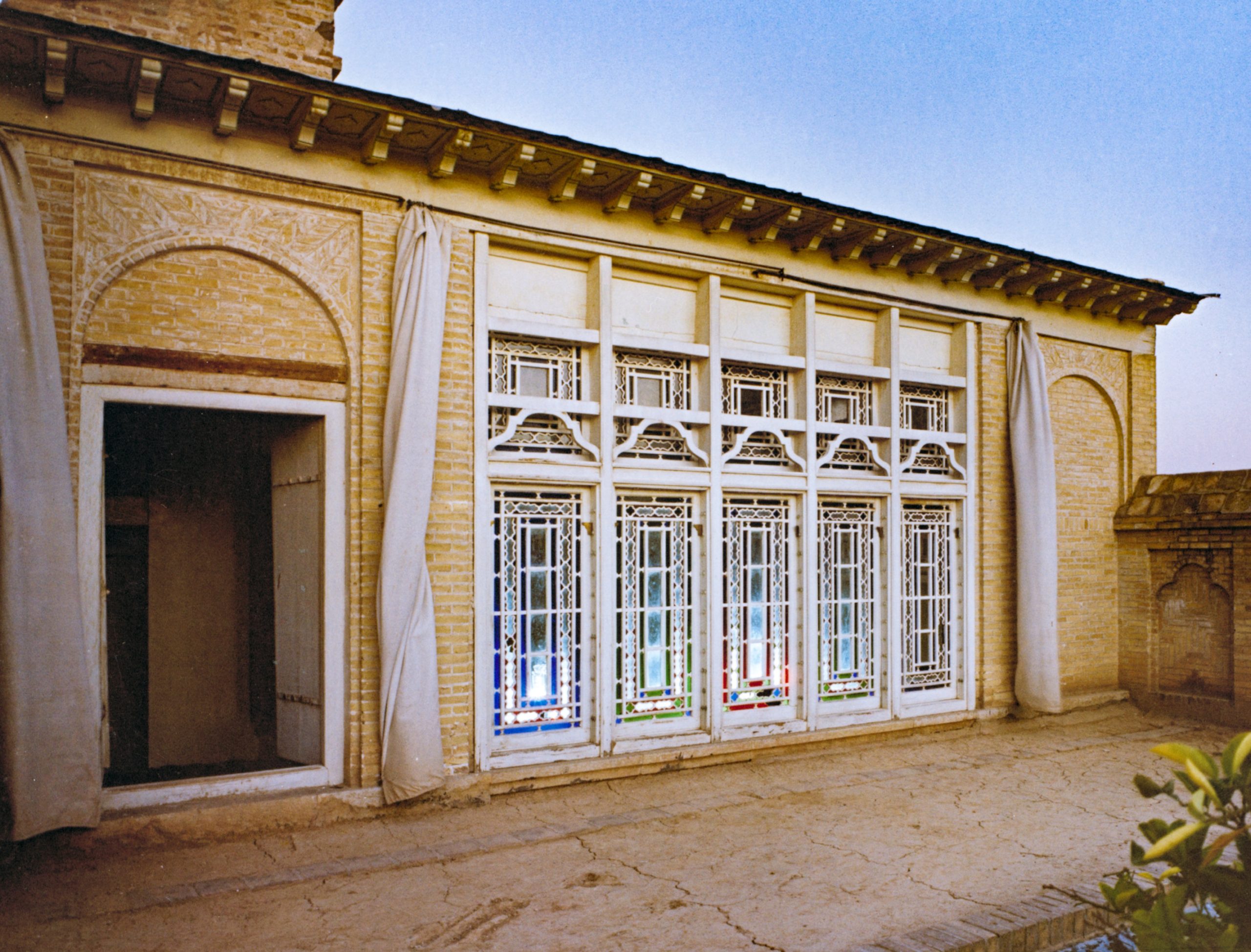
A view of the upper portion of His house in Shíráz, where the Báb led Mullá Ḥusayn after he entered His home. This photo shows that portion before its destruction in 1979. Source: Bahá'í Media Bank, © Bahá'í International Community 2023.
Mullá Ḥusayn followed his Host to the chamber in the upper part of the house, wondering if he was drawing nearer to the Object of his quest, and what would come after that.
As he followed the Báb through His home, Mullá Ḥusayn began to feel an indescribable sense of joy, filling his entire being. They took their seats in the upper chamber, and the Báb invited Mullá Ḥusayn to perform his ablutions, pouring the water over his hands. Afterwards, He prepared and offered Mullá Ḥusayn a cup of tea.
Overwhelmed with the Báb’s acts of kindness, Mullá Ḥusayn tried to leave. He explained to the Báb that it was nearly time for evening prayers, and that his nephew and brother were expecting him, but the Báb again kept him at His side, telling him, with His distinctive calm and courtesy:
“You must surely have made the hour of your return conditional upon the will and pleasure of God. It seems that His will has decreed otherwise. You need have no fear of having broken your pledge.”
The Báb’s dignity and self-assurance silenced Mullá Ḥusayn. Together, they performed their ablutions and their evening obligatory prayer, side by side.
Acutely feeling the strain and stress of his search for the Promised One, Mullá Ḥusayn whispered a prayer to God on his breath:
“I have striven with all my soul, O my God, and until now have failed to find Thy promised Messenger. I testify that Thy word faileth not, and that Thy promise is sure.”
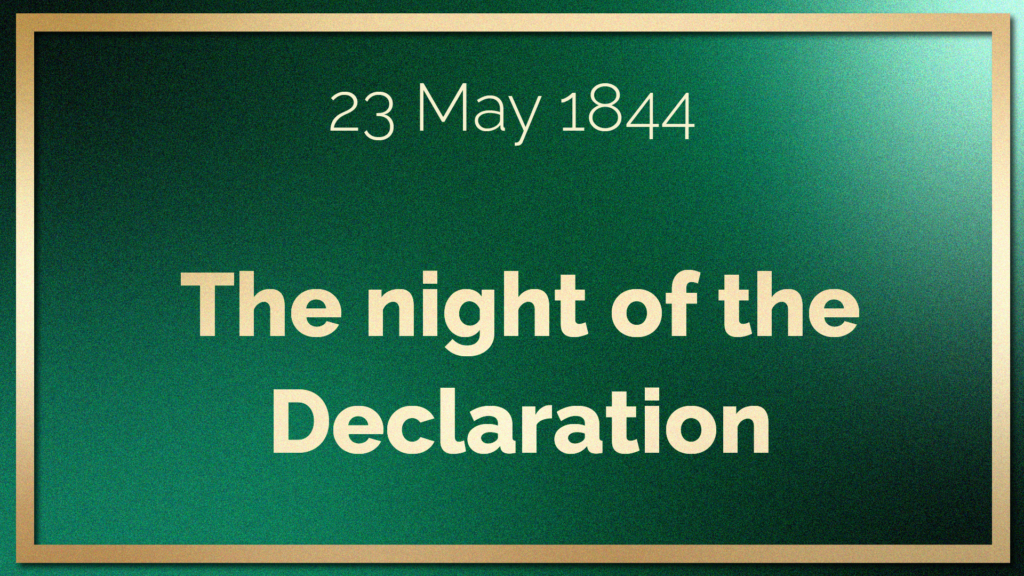
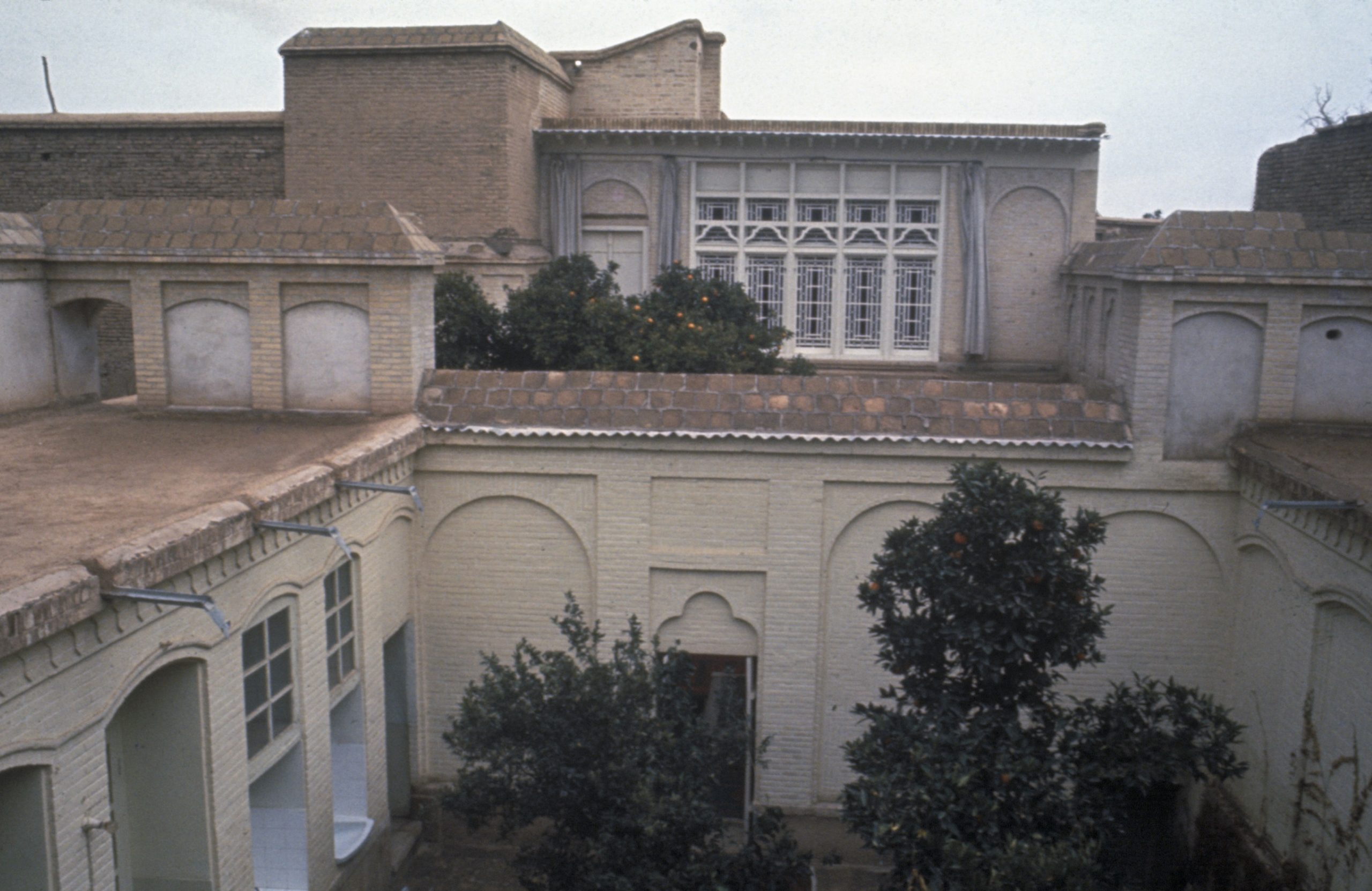
Overview of the house of the Báb in Shíráz. The upper chamber where the Báb and Mullá Ḥusayn are having a conversation is the room with vertical windows is at the top in the center of the photograph. Source: Bahá'í Media Bank, © Bahá'í International Community 2023.
One hour after sunset, the Báb began speaking with Mullá Ḥusayn:
The Báb: “Whom, after Siyyid Kázim do you regard as his successor and your leader?”
Mullá Ḥusayn: “At the hour of his death, our departed teacher insistently exhorted us to forsake our homes, to scatter far and wide, in quest of the promised Beloved. I have, accordingly, journeyed to Persia, have arisen to accomplish his will, and am still engaged in my quest.”
The Báb: “Has your teacher given you any detailed indications as to the distinguishing features of the promised One?”
Mullá Ḥusayn: “Yes. He is of a pure lineage, is of illustrious descent, and of the seed of Fáṭimih. As to His age, He is more than twenty and less than thirty. He is endowed with innate knowledge. He is of medium height, abstains from smoking, and is free from bodily deficiency.”
The Báb paused for a while, then declared in a vibrant voice:
“Behold, all these signs are manifest in Me!”
The Báb then proceeded to demonstrate how, one by one, each of the characteristics were applicable to Him.
Mullá Ḥusayn was greatly surprised by the Báb’s claim and politely observed:
“He whose advent we await is a Man of unsurpassed holiness, and the Cause He is to reveal, a Cause of tremendous power. Many and diverse are the requirements which He who claims to be its visible embodiment must needs fulfil. How often has Siyyid Kázim referred to the vastness of the knowledge of the promised One! How often did he say: ‘My own knowledge is but a drop compared with that with which He has been endowed. All my attainments are but a speck of dust in the face of the immensity of His knowledge. Nay, immeasurable is the difference!’”
As soon as he had spoken those words, Mullá Ḥusayn felt seized with fear and remorse in a way he could neither hide nor explain, and he immediately decided to change his attitude and soften his tone.
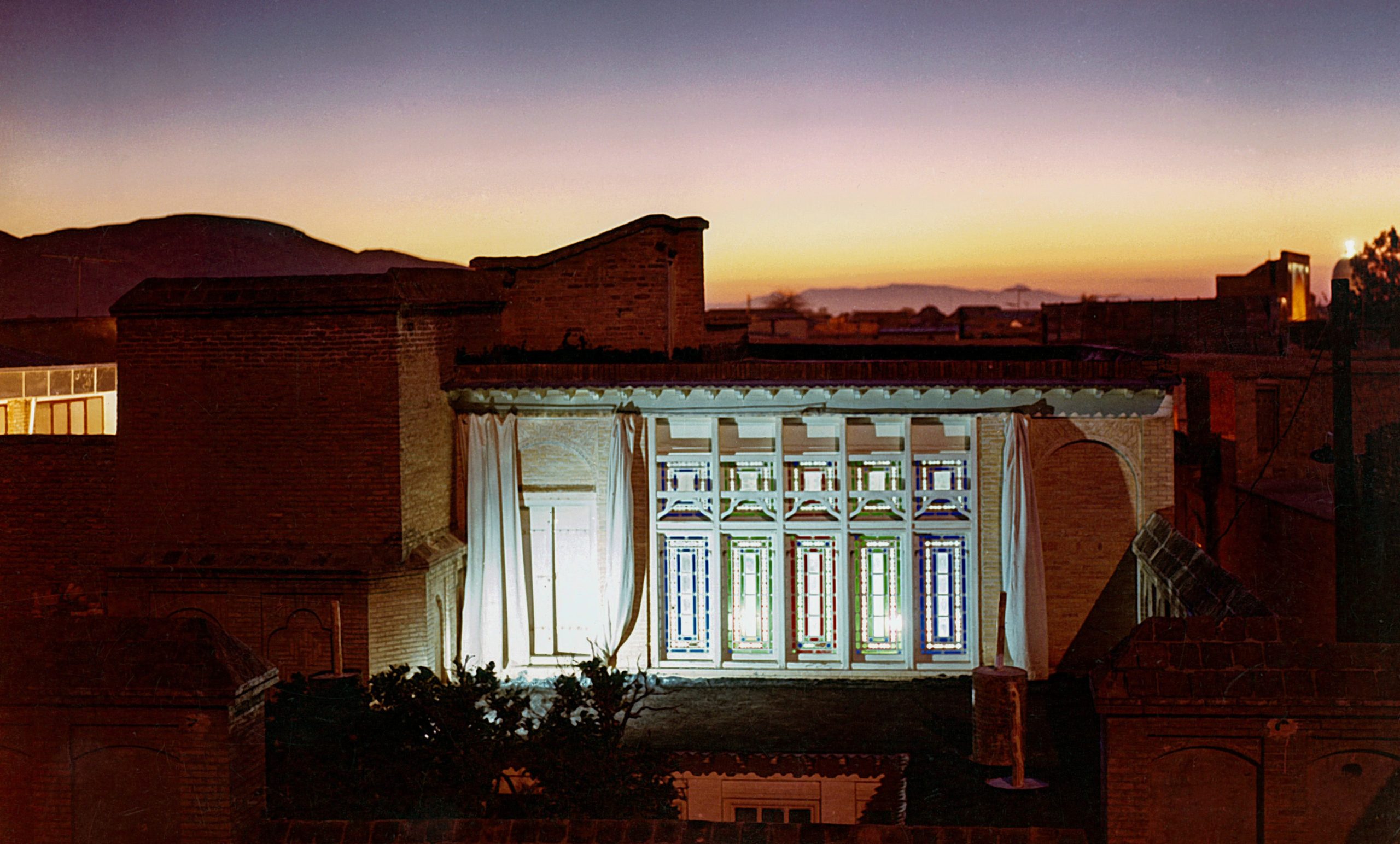
The House of the Báb at dusk, showing the upper chamber where the Báb and Mullá Ḥusayn are continuing their conversation, immediately before the Báb’s Declaration. Source: Bahá'í Media Bank, © Bahá'í International Community 2023.
When he had set out on his quest, Mullá Ḥusayn had determined two standards by which he would find the Promised Qá’im.
The first was to unravel the mysterious allusions in a treatise on the obscure hidden teachings of Shaykh Aḥmad-i-Aḥsá’í and Siyyid Káẓim-i-Rashtí.
The second was reveal without hesitation or reflection a commentary on the Súrih of Joseph in a completely new style and language. Even Siyyid Káẓim had refused this second test, saying:
“This is, verily, beyond me. He, that great One, who comes after me will, unasked, reveal it for you. That commentary will constitute one of the weightiest testimonies of His truth, and one of the clearest evidences of the loftiness of His position.”
As Mullá Ḥusayn was thinking about these standards, The Báb spoke again:
“Observe attentively. Might not the Person intended by Siyyid Káẓim be none other than I?”
At this point, Mullá Ḥusayn decided to present the Báb with the first of his tests, and handed Him his treatise saying:
“Will you read this book of mine and look at its pages with indulgent eyes? I pray you to overlook my weaknesses and failings.”
The Báb graciously received the treatise and started to look through it, opening the book, glancing at passages, and, after only a few minutes, He closed it and began to address Mullá Ḥusayn with His characteristic vigor and charm, effortlessly unraveling all its hidden mysteries, and resolving all its problems.
Then, the Báb went even further and expounded on refreshing, and powerful new truths that Mullá Ḥusayn had never heard before, and which could not be found in any of the Ḥadíths, nor the writings of Shaykh Aḥmad or Siyyid Káẓim.
Afterwards, the Báb addressed Mullá Ḥusayn:
“Had you not been My guest, your position would indeed have been a grievous one. The all-encompassing grace of God has saved you. It is for God to test His servants, and not for His servants to judge Him in accordance with their deficient standards. Were I to fail to resolve your perplexities, could the Reality that shines within Me be regarded as powerless, or My knowledge be accused as faulty? Nay, by the righteousness of God! it behoves, in this day, the peoples and nations of both the East and the West to hasten to this threshold, and here seek to obtain the reviving grace of the Merciful. Whoso hesitates will indeed be in grievous loss. Do not the peoples of the earth testify that the fundamental purpose of their creation is the knowledge and adoration of God? It behoves them to arise, as earnestly and spontaneously as you have arisen, and to seek with determination and constancy their promised Beloved.”
And then the Báb pre-empted Mullá Ḥusayn’s second test with these historic words:
“Now is the time to reveal the commentary on the Súrih of Joseph.”
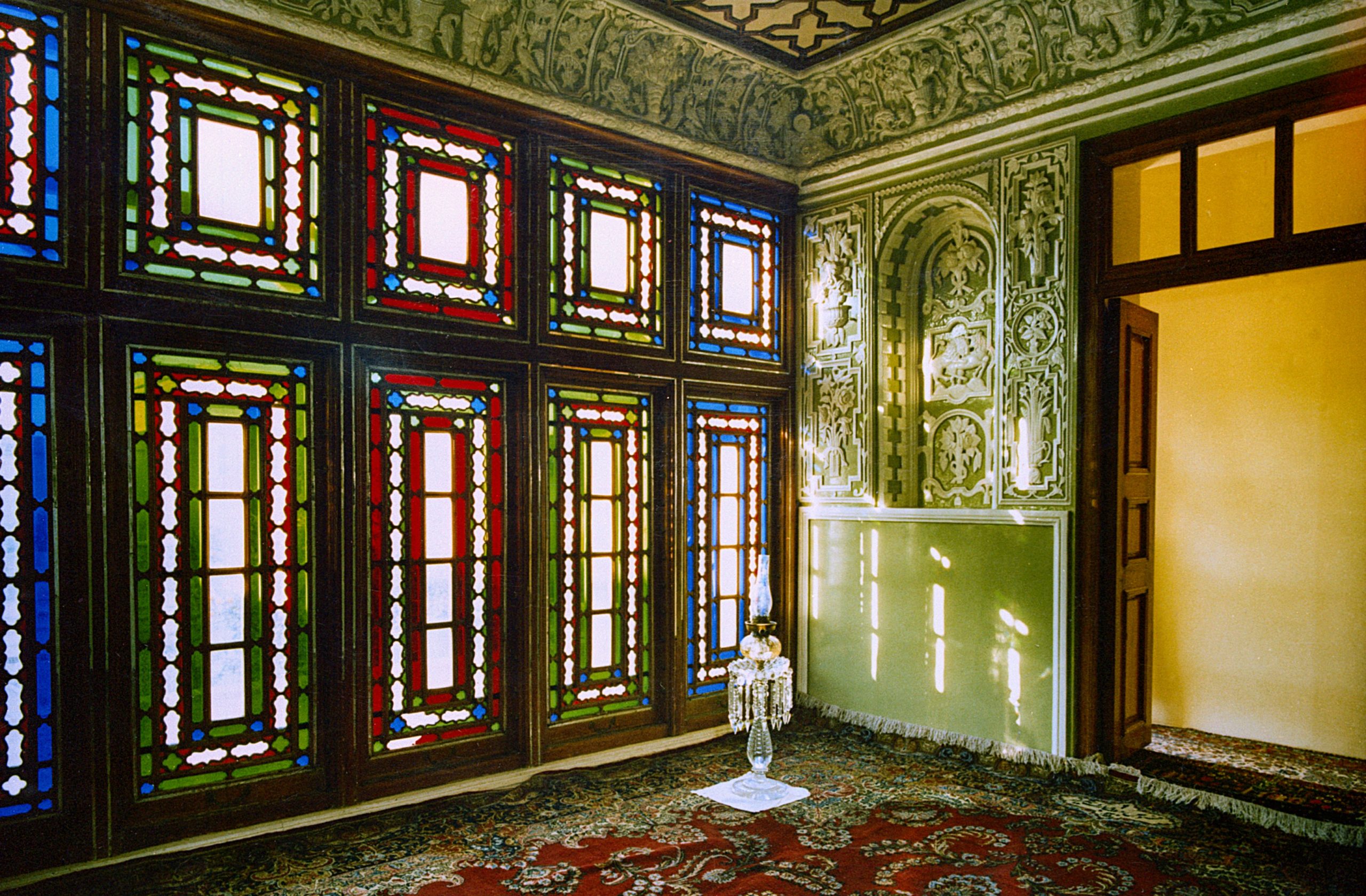
The inside of the upper chamber of His house, where the Báb declared His mission to Mullá Ḥusayn, two hours and eleven minutes after sunset. Source: Bahá'í Media Bank, © Bahá'í International Community 2023.
The exact hour and minute of the beginning of the Dispensation and of the Revelation of the Báb is given to us by the Báb Himself in the Persian Bayán II, 7:
“And from the moment when the Tree of the Bayán appeared until it disappeareth is the Resurrection of the Apostle of God, as is divinely foretold in the Qur’án; the beginning of which was when two hours and eleven minutes had passed on the eve of the fifth of Jamádíyu’l-Avval, 1260 A.H.,* which is the year 1270 of the Declaration of the Mission of Muḥammad. This was the beginning of the Day of Resurrection of the Qur’án, and until the disappearance of the Tree of divine Reality is the Resurrection of the Qur’án.”
* 22 May 1844.
The Báb took up His pen, and with incredible speed revealed the entire first chapter of His commentary on the Súrih of Joseph, which we know as the Qayyúmu’l-Asmá’. As He revealed the holy verses, the Báb gently intoned them, and He did not pause, slow, or interrupt the flow of Revelation that streamed from Him until the chapter was completed.
Mullá Ḥusayn sat, enraptured by the magic of His voice and the power of His Revelation. When he rose to return to the Masjid, the Báb smilingly asked him to sit down:
“If you leave in such a state, whoever sees you will assuredly say: ‘This poor youth has lost his mind.’”
In this moment, the Bábí Revelation and the Bahá'í Dispensation were born.
The Báb spoke again:
“This night, this very hour will, in the days to come, be celebrated as one of the greatest and most significant of all festivals. Render thanks to God for having graciously assisted you to attain your heart’s desire, and for having quaffed from the sealed wine of His utterance. ‘Well is it with them that attain thereunto.’”
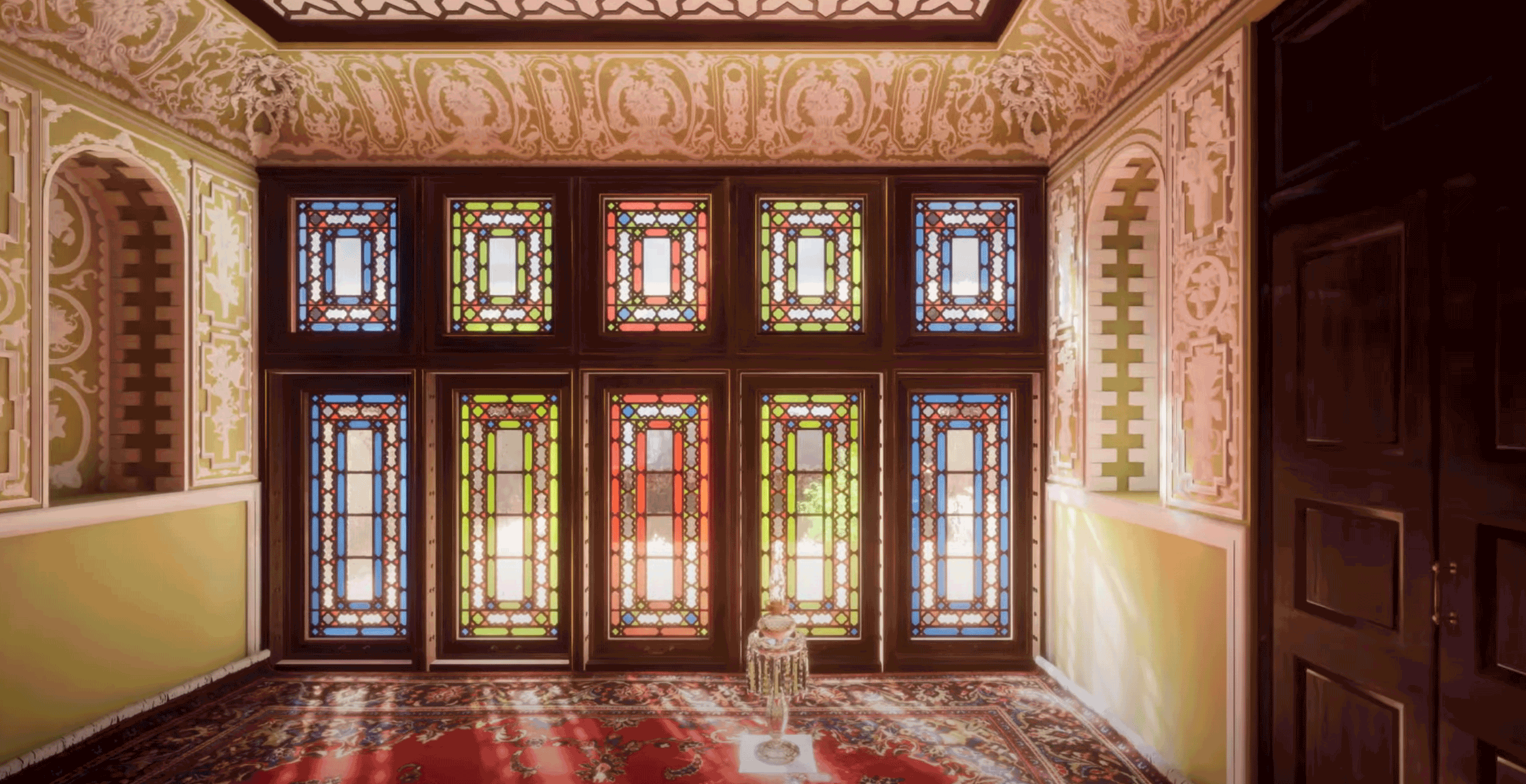
For another perspective on the night of the Declaration of the Báb, another angle of the Declaration chamber: still image from The House of the Báb: The Declaration Chamber, by Oscar Gomez.
Khadíjih Bagum had gone to bed earlier that evening as the Báb had asked her. She had no wish to disobey her Husband, but she could not sleep.
All night, she had remained awake, and heard the Báb’s blessed voice talking to Mullá Ḥusayn, chanting verses, presenting proofs, and offering arguments.
Every day, from that day forward, the Báb would entertain a new, previously-unknown guest, and every day He would speak to them in that way. These mysterious guests would later be known as the Letters of the Living.
We will be looking at their stories, and their rank and station in detail in The Primal Point: Part V: Ḥurúf-i-Ḥayy : The Letters of the Living.
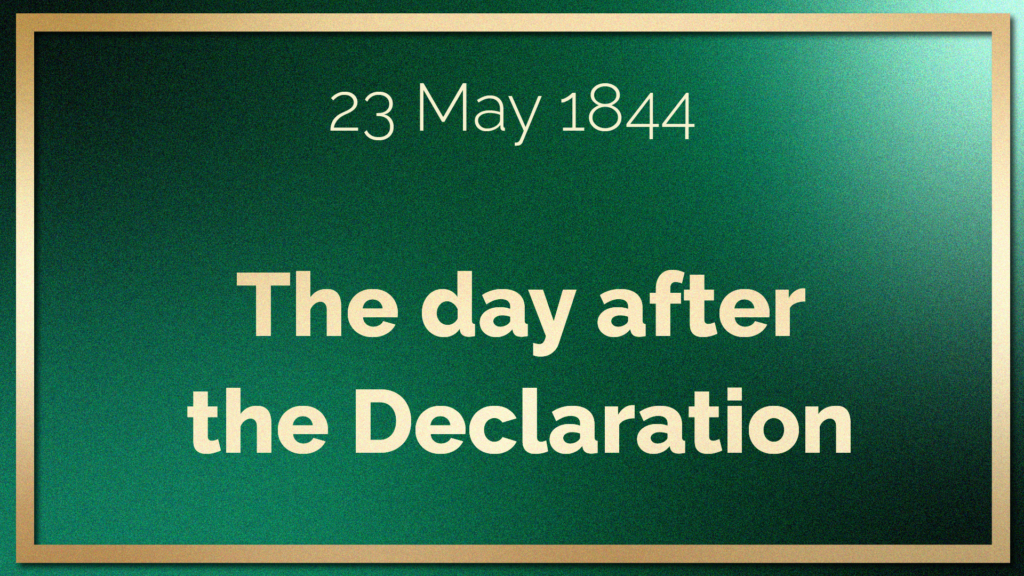
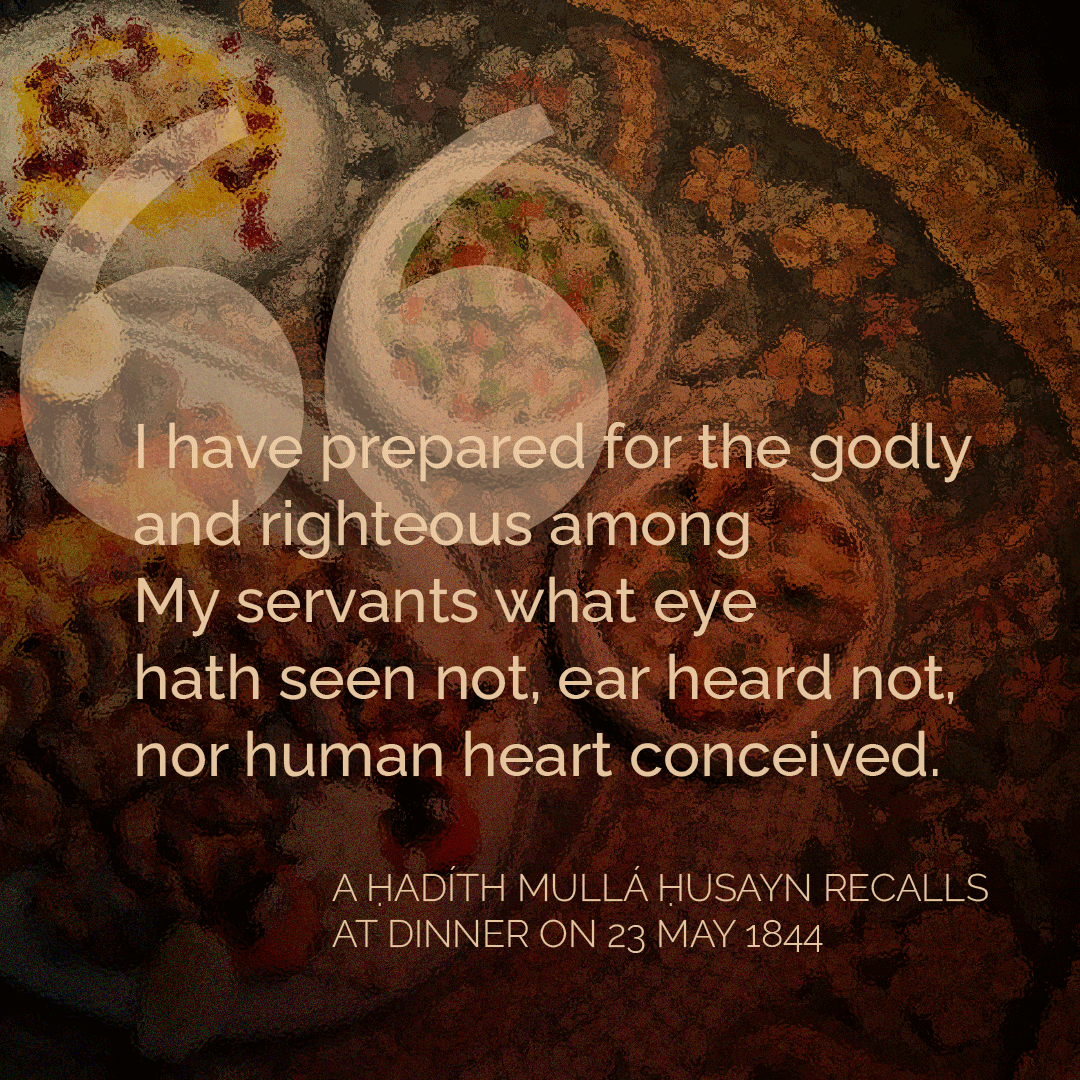
“Heavenly Feast”: A decorated quote of the Ḥadíth recalled by Mullá Ḥusayn at dinner with the Báb, catered by Ḥájí Mubárak. © Violetta Zein
Three hours after sunset, the Báb asked for dinner to be served, and Ḥájí Mubárak laid out a feast of the choicest foods. Mullá Ḥusayn felt refreshed in both his body and soul after that holy dinner, and, in the company of the Báb, felt like he was eating the fruits of Paradise.
Mullá Ḥusayn marveled at Ḥájí Mubárak’s manners and his devoted attentions. It seemed to Mullá Ḥusayn that Ḥájí Mubárak’s life had been transformed by the Báb’s regenerating influence.
It was then that Mullá Ḥusayn recalled a Ḥadíth ascribed to the Prophet Muḥammad:
“I have prepared for the godly and righteous among My servants what eye hath seen not, ear heard not, nor human heart conceived.”
This Ḥadíth convinced Mullá Ḥusayn that had the Báb no other claim to greatness, this dinner would have sufficed: that He had been able to host Mullá Ḥusayn with such a quality of hospitality and loving-kindness that no other human being could possibly emulate.
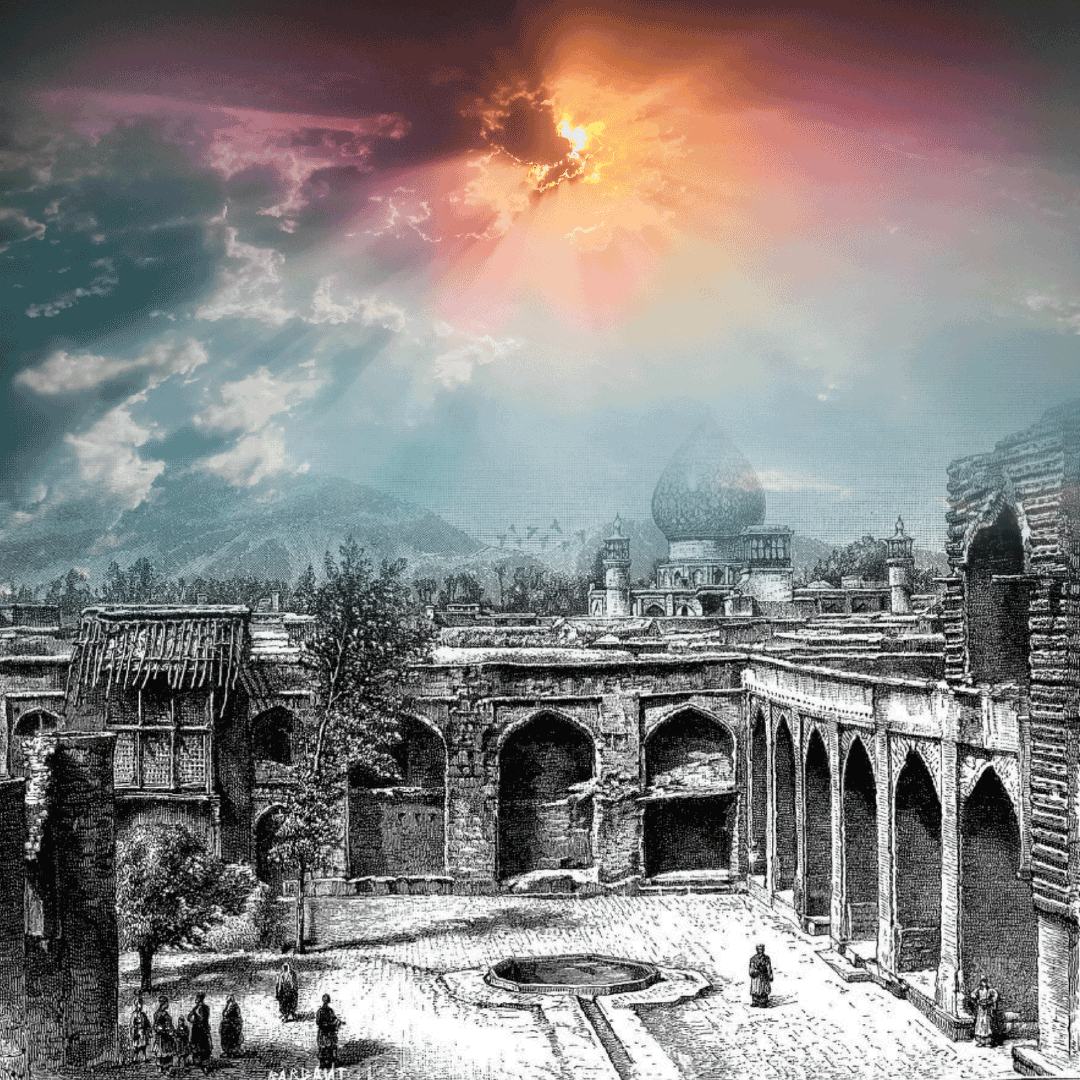
“Dawn”: An artistic recreation of dawn over Shíráz on the morning of 23 May 1844, the Imám calling to prayer from a nearby mosque. © Violetta Zein Original image: Djouma mosque in Shíráz, from Jane Dieulafoy, La Perse, la Chaldée et la Susiane, page 441. Source : Archive.org.
After dinner, Mullá Ḥusayn sat spellbound by the Báb’s utterances and completely oblivious of the time and of those who were waiting for him. Six hours passed in the blink of an eye, and Mullá Ḥusayn heard the Muezzin’s call for dawn prayers. Suddenly, he was awoken from the state of ecstasy in which he had fallen, after experiencing the spiritual bliss of the Báb’s Revelation.
Mullá Ḥusayn had forgotten to sleep that night, so enthralled by the music of the Báb’s voice, swelling as He revealed verses, ethereal in its subtle harmonies as He uttered prayers, repeating, after each invocation, the verses:
“Far from the glory of thy Lord, the All-Glorious, be that which His creatures affirm of Him! And peace be upon His Messengers! And praise be to God, the Lord of all beings!”
Soon after the call to prayer had rung through the streets of Shíráz, the Báb spoke these words to Mullá Ḥusayn:
“O thou who art the first to believe in Me! Verily I say, I am the Báb, the Gate of God, and thou art the Bábu’l-Báb, the gate of that Gate. Eighteen souls must, in the beginning, spontaneously and of their own accord, accept Me and recognise the truth of My Revelation. Unwarned and uninvited, each of these must seek independently to find Me. And when their number is complete, one of them must needs be chosen to accompany Me on My pilgrimage to Mecca and Medina. There I shall deliver the Message of God to the Sharíf of Mecca. I then shall return to Kúfih, where again, in the Masjid of that holy city, I shall manifest His Cause. It is incumbent upon you not to divulge, either to your companions or to any other soul, that which you have seen and heard. Be engaged in the Masjid-i-Ílkhání in prayer and in teaching. I, too, will there join you in congregational prayer. Beware lest your attitude towards Me betray the secret of your faith. You should continue in this occupation and maintain this attitude until our departure for Ḥijáz. Ere we depart, we shall appoint unto each of the eighteen souls his special mission, and shall send them forth to accomplish their task. We shall instruct them to teach the Word of God and to quicken the souls of men.”
Then, the Báb accompanied Mullá Ḥusayn to the door, and committed him in the care of God.
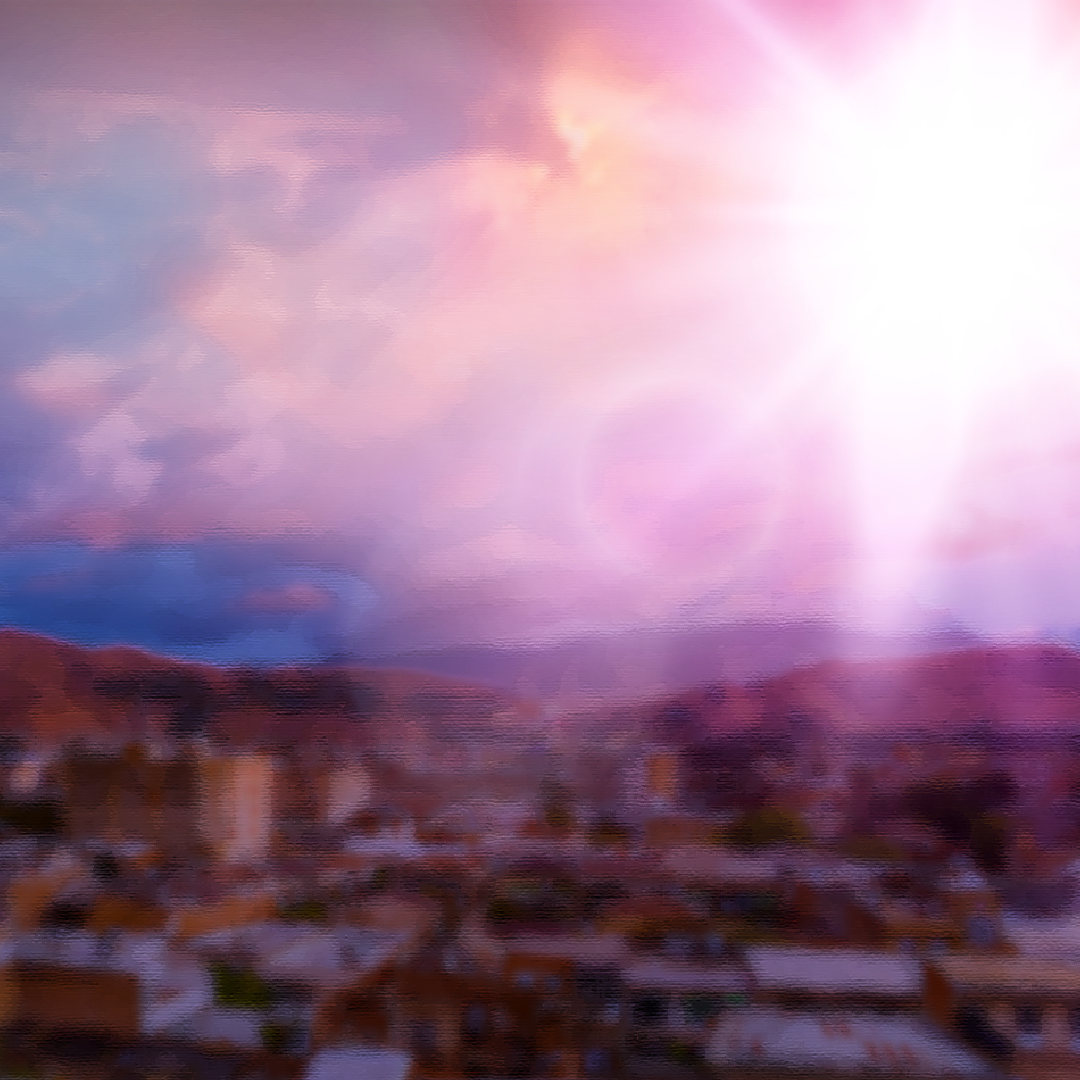
“Morning light has broken”: A digital painting of Shíráz at dawn, as Mullá Ḥusayn steps out into the city, hearing words of prophecy. © Violetta Zein
The Revelation of the Báb, so suddenly thrust upon him, had the effect of a thunderbolt on Mullá Ḥusayn.
He felt blinded by its dazzling splendor and overwhelmed by its crushing force. His faculties were numbed for a time, and he felt transfigured by a rush of emotions: excitement, joy, awe, wonder, gladness, and strength.
Mullá Ḥusayn felt galvanized by the knowledge of this new Revelation, and filled with such courage and power that he felt as though he could have withstood the onslaught of the entire world, its peoples, and rulers.
When Mullá Ḥusayn stepped out into the streets of Shíráz that morning, filled with joy, his life had changed forever. He had given up a brilliant career in the clergy without a second’s hesitation. Mullá Ḥusayn at the time was already well-known in prestigious Islamic circles. He had great theological capacity, a penetrating intelligence and profound learning, and would have no doubt been among the most influential clerics of his generation in Persia.
At this crossroads in his life, Mullá Ḥusayn decided to choose a path that took him in the opposite direction, and gave his entire allegiance, pledged his bright and promising future to a young, unknown Siyyid of Shíráz, whom he had just met a few hours before.
Mullá Ḥusayn states he felt like the voice of the Angel Gabriel personified, calling all mankind:
“Awake, for lo! the morning Light has broken. Arise, for His Cause is made manifest. The portal of His grace is open wide; enter therein, O peoples of the world! For He who is your promised One is come!”
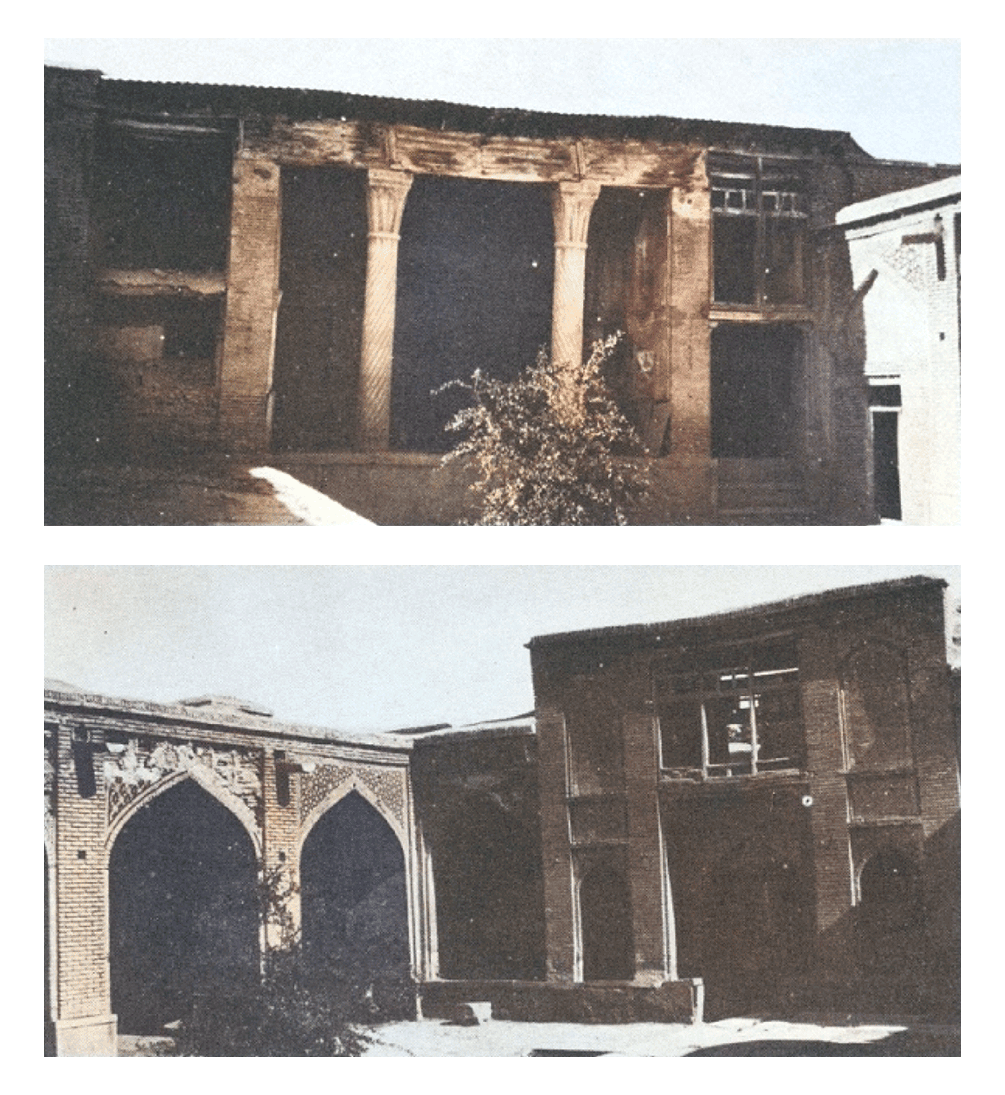
Two views of the Masjid-i-Ílkhání, where Mullá Ḥusayn’s companions are waiting for him, colorized for this chronology by Violetta Zein. Original images: Nabil, The Dawn-Breakers, page 60.
It was in such a state that Mullá Ḥusayn rejoined his brother and nephew and found that a large contingent of Shírází followers of Shaykh Aḥmad and Siyyid Káẓim had gathered to meet him.
Mullá Ḥusayn followed the Báb’s instructions faithfully. He did not disclose his life-altering spiritual experience with his companions, but diligently devoted his life in the Masjid-i-Ílkhání to prayer and teaching classes.
Gradually, more and more people, including the notables of Shíráz, came to attend Mullá Ḥusayn’s class and marveled at the spirit emanating from his lectures, unaware of the True Source of his inspiration.
During this time, the Báb summoned Mullá Ḥusayn to His home several times, by sending Ḥájí Mubárak to the Masjid. Every time Mullá Ḥusayn visited, he spent the entire night at the Báb’s feet, utterly enraptured and fascinated by His utterances and forgetful of everything else.
On one of these blessed nights, the Báb told Mullá Ḥusayn:
“To-morrow thirteen of your companions will arrive. To each of them extend the utmost loving-kindness. Leave them not to themselves, for they have dedicated their lives to the quest of their Beloved. Pray to God that He may graciously enable them to walk securely in that path which is finer than a hair and keener than a sword. Certain ones among them will be accounted, in the sight of God, as His chosen and favoured disciples. As to others, they will tread the middle way. The fate of the rest will remain undeclared until the hour when all that is hidden shall be made manifest.”
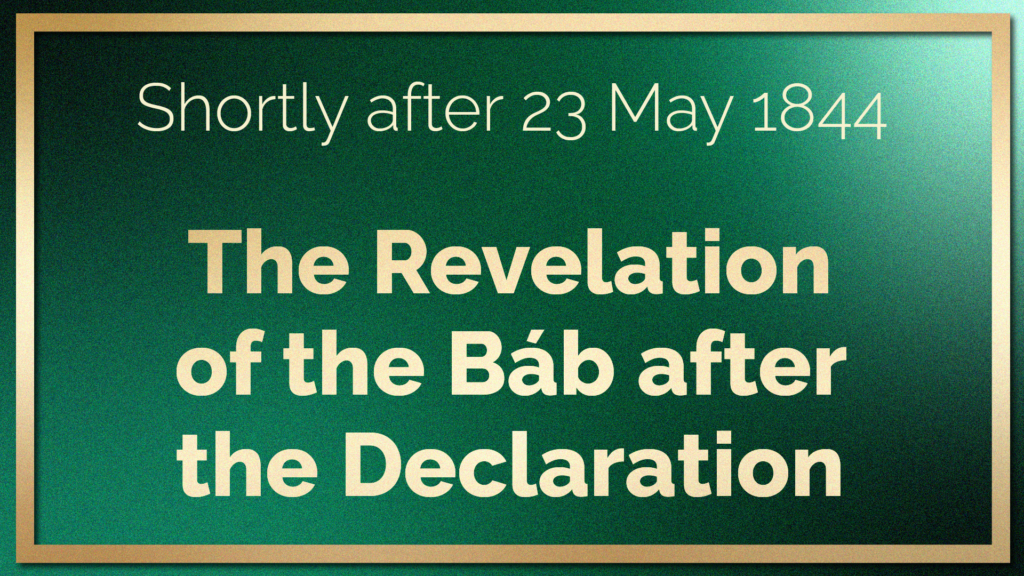
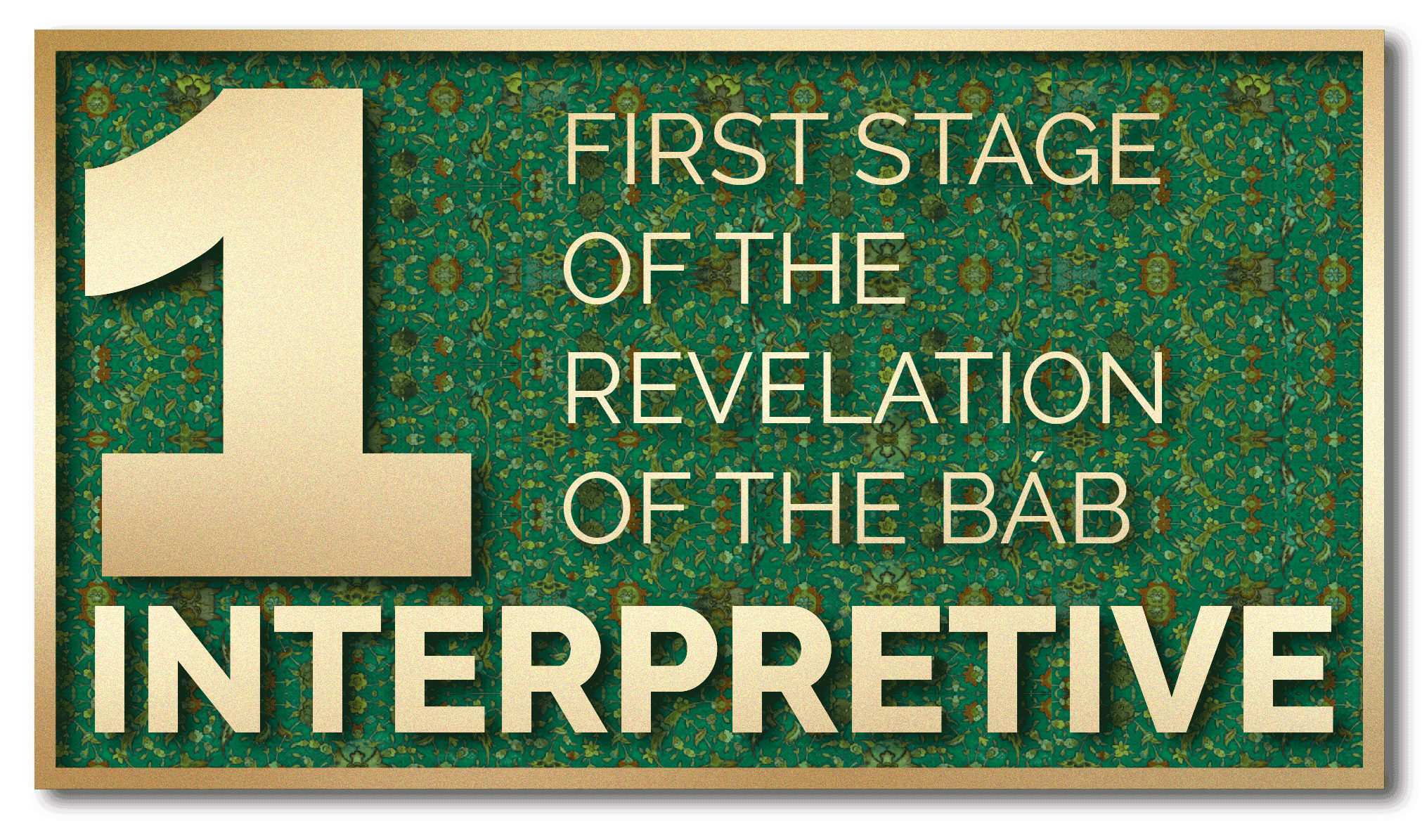
The Báb’s Writings can be grouped into three broad stages, each characterized by a particular dominant thematic focus.
The early writings, from before the Báb’s Declaration (23 May 1844) until January 1846, are form the first, interpretive state of His Revelation.
They are, for the most part, interpretations of verses, súrihs, and letters from the Qur’án, which was revealed in Arabic, the language of the Báb’s Revelation for this stage is Arabic.
As the Báb marked the end of Islamic Dispensation and the start of the Bahá'í Dispensation, it makes perfect sense for the first stage of His Revelation to expound upon, explain, elucidate, and clarify the Islamic Revelation. This stage was the link, bringing His followers from their Muslim Faith to the new Bábí religion.
It should be noted that the interpretive mode is not limited to the first stage of the Báb’s Revelation. The Báb uses the interpretive mode throughout the next two stages of His Revelation, but His emphasis on content shifts progressively to philosophical and legislative topics over the course of His ministry.

The Báb revealed this crucial text in honor of Mullá Ḥusayn. He began revealing the Qayyúmu'l-Asmá' (The Commentary on the Súrih of Joseph) on 23 May 1844, and completed the commentary 40 days later, around 2 July 1844.
The Qayyúmu'l-Asmá' is composed of 111 chapters, exactly the same number as the Qur’ánic Súrih of Joseph, or Súrih Yúsuf, and is dedicated to interpreting the Súrih of Joseph from the vantage point of progressive Revelation, in the process disclosing the stations of the Báb and Bahá'u'lláh.
Although the work is interpretive, the Báb revealed the Qayyúmu'l-Asmá' in the mode of divine verses, the mode in which the Qur’án and all Holy Books are revealed, and not a mode usually used for writing commentaries—that would be, predicably, the mode of commentary. The mode of divine verses is the voice of God speaking through His Manifestation to His creation.
It is no act of coincidence that the Báb chose the Súrih of Joseph from the Qur’án as the means by which to declare His mission. First, the form of the commentary itself reveals the Báb’s true station. By equating the Arabic name “Joseph” with the word “Qayyúm” (Self-Subsisting), in the equal numerical value of their letters, the Báb is announcing Himself as the Qá’im, the Promised One of Islám.
A particularly fascinating aspect of the Qayyúmu'l-Asmá' is the complete unity between the Báb and His Work. This can be seen in the deeply intricate and meaningful organizational structure of the Qayyúmu'l-Asmá': each of the 111 chapters contains exactly 42 verses.
The number 42 is equal to the numerical value of the letters in the word “balá” (“yea”), the answer to the question “Am I not your Lord?” And therefore, the very structure of the Qayyúmu'l-Asmá' itself announces 111 times that the Báb has come, and that He is the Manifestation of God for today. It is almost as if the Qayyúmu'l-Asmá' IS the Báb and the Báb IS the Qayyúmu'l-Asmá', the Word of God made flesh.
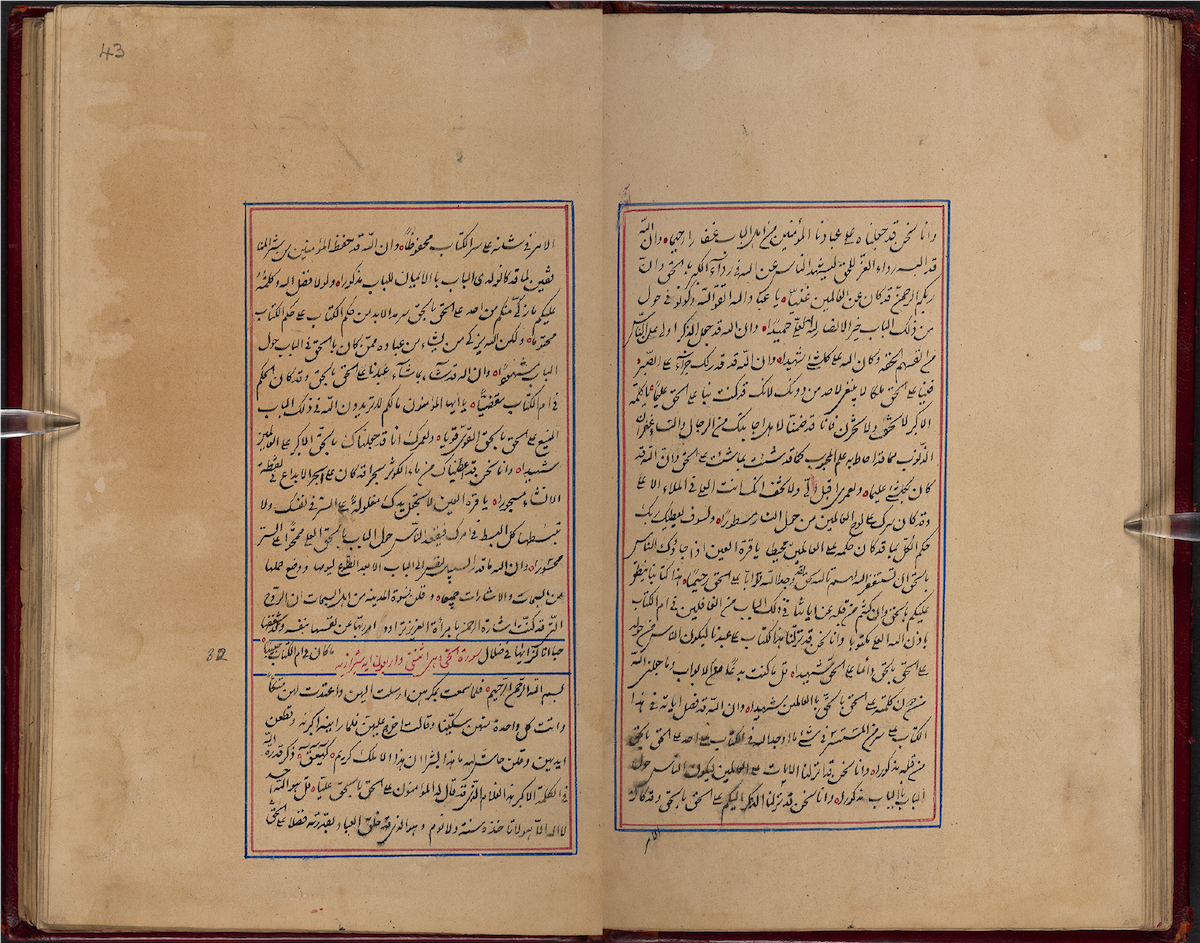
Two pages from the Qayyúmu'l-Asmá' from the collection of the British Library.
A recurrent theme in the Qayyúmu'l-Asmá' is that of the “mystery” of the Báb and His station, and the work also contains a frequent reference to figurative elements such as fire, air, water, and earth/dust. According to Dr. Saiedi, these four elements are often used to refer to the Báb:
“...as the “Burning Bush,” the “Voice of the Burning Bush,” the “The Fire within the Point of Ice,” the “Celestial Heaven around the Fire,” and the “Sacred Earth of Revelation.” The four elements symbolize, in metaphorical language, the four layers of the divine gate of the heart covenant, representing stations that originate from the Primal Will and which end in the Gate.”
In the first chapter of the Qayyúmu'l-Asmá' called Mulk (“Sovereignty”), revealed on the night of His Declaration, the Báb calls on the leaders of society, both the rulers and the clerics to propagate His mission and His message. This is a central concept to Islám, the idea that the Cause of God would be rendered victorious when kings and leaders of nations embraced the Faith, and their peoples would follow.
Perhaps, in closing, the most powerful testament to the revolutionary nature of the Qayyúmu'l-Asmá' can be found in this introductory chapter, where the Báb does two groundbreaking things: He reveals a shocking new definition of Islám, and directly asserts His spiritual sovereignty (“Mulk”) as the new Manifestation of God, calling for all people to submit to His authority:
“Verily, the essence of religion is none other than submission unto This Remembrance. Thus whoso seeketh Islam (submission to God), let him submit unto this Remembrance. For God will inscribe his name in the Book of the Righteous as a true Muslim, and he will be praised as one who is faithful. Whoso rejecteth this true Islam, God shall not accept, on the Day of Resurrection, any of his deeds.”
For more information, please refer to Dr. Nader Saiedi, Gate of the Heart: Understanding the Writings of the Báb, Chapter 4: The Structure of the Qayyúmu'l-Asmá', and Chapter 5: The Qayyúmu'l-Asmá' as Interpretation.
Partial Inventory ID: BB00002
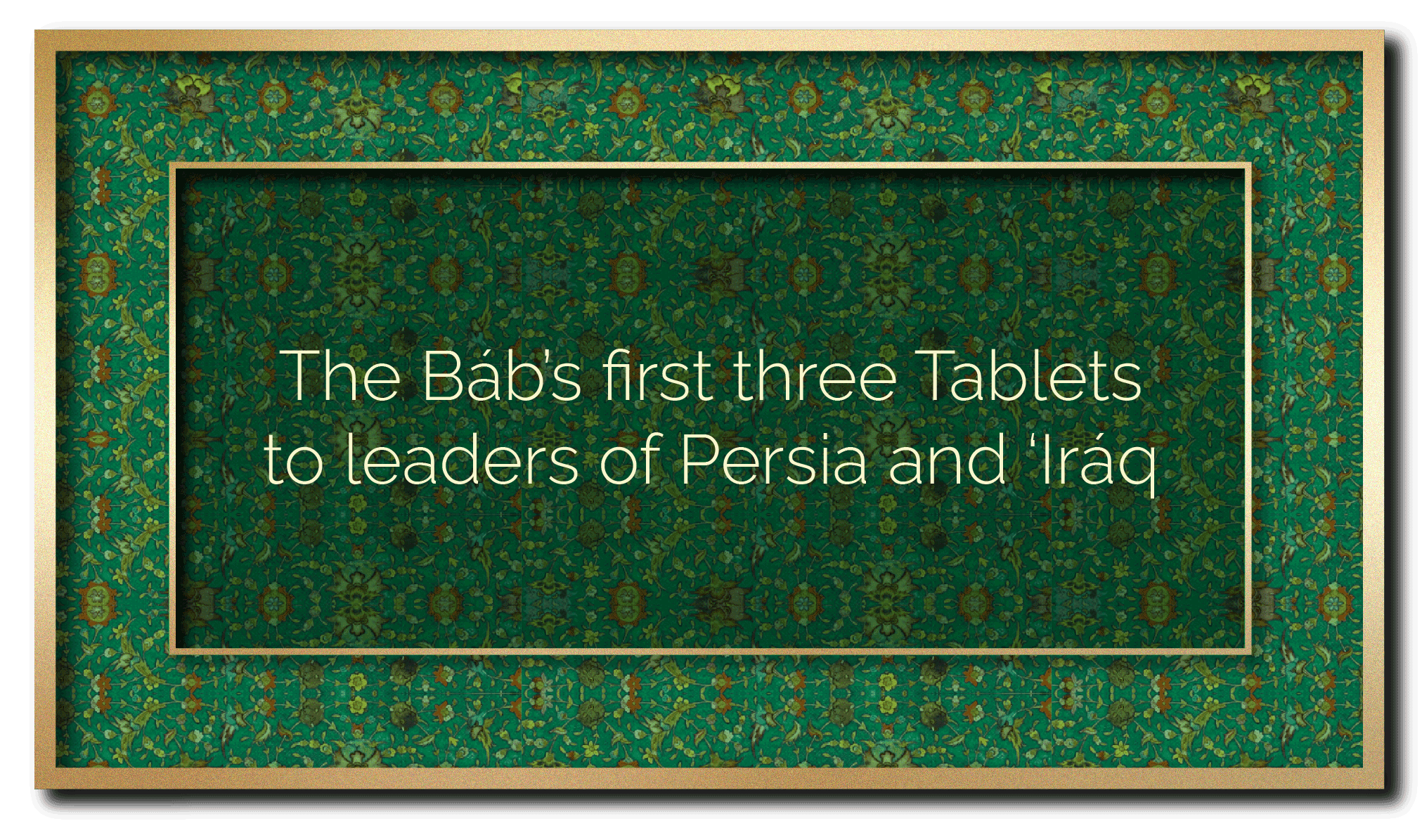
One of the first acts of the Báb after His Declaration was to write Tablets to three leaders of 'Iráq and Persia: Shaykh Muḥammad-Ḥasan al-Najafí of 'Iráq, and Muḥammad Sháh and Ḥájí Mírzá Áqásí the sovereign and Prime Minister of Persia.
There are no translations for either of these three epistles, and they are mentioned here because of the symbolic significance of the Báb revealing Tablets to leaders immediately after His Declaration.
The Báb’s Tablet to Shaykh Muḥammad-Ḥasan al-Najafí is Partial Inventory ID: BB00073
The Báb’s first Tablet to Muḥammad Sháh is Partial Inventory ID: BB00018
The Báb’s first Tablet to Ḥájí Mírzá Áqásí is Partial Inventory ID: BB00241
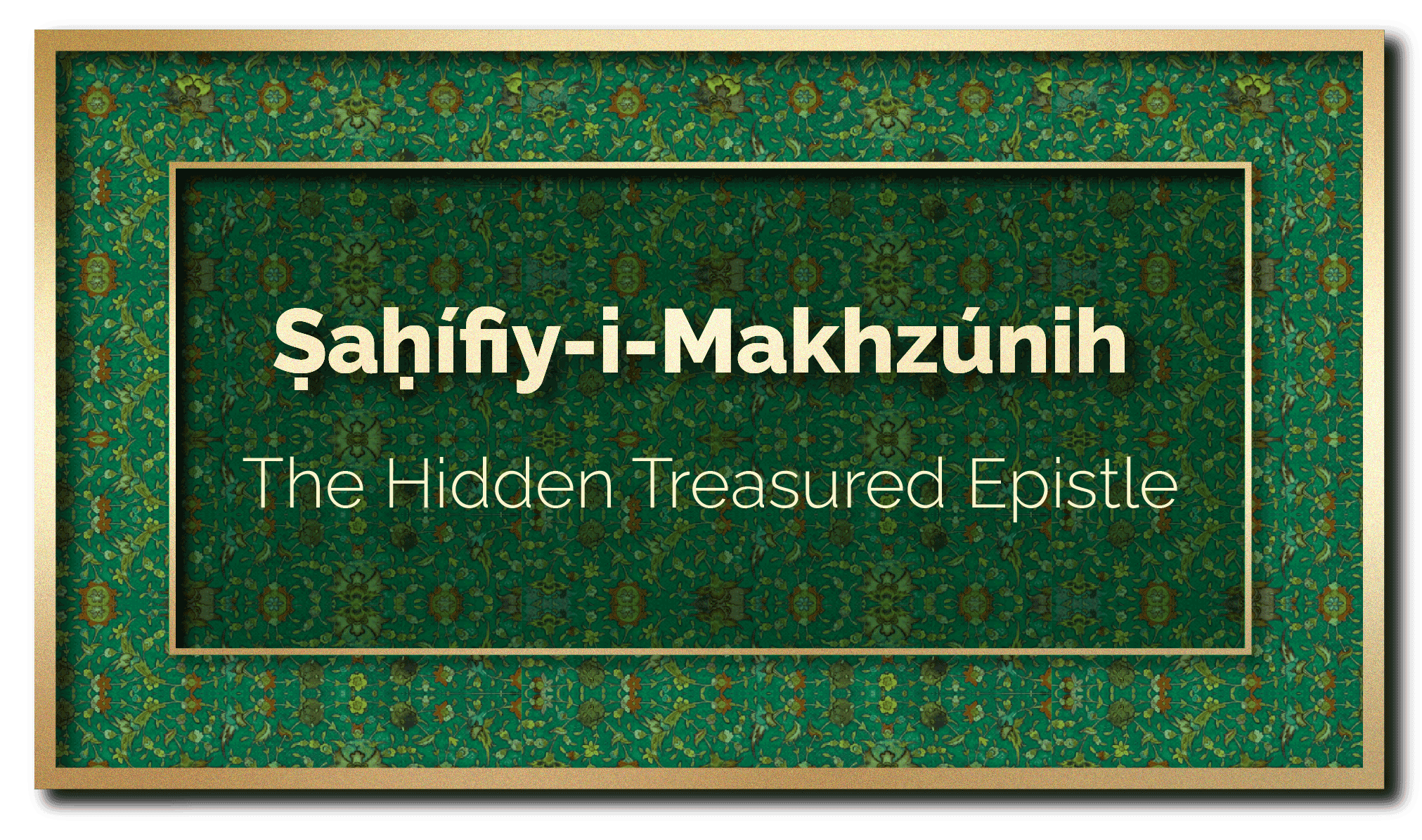 Shortly after His Declaration, the Báb revealed a compilation of 14 prayers and Tablets of Visitation called Ṣaḥífiy-i-Makhzúnih (The Hidden Treasured Epistle). One Tablet of Visitation is related to the night of the Declaration.
Shortly after His Declaration, the Báb revealed a compilation of 14 prayers and Tablets of Visitation called Ṣaḥífiy-i-Makhzúnih (The Hidden Treasured Epistle). One Tablet of Visitation is related to the night of the Declaration.
Click on the image below listen to a short excerpt from the Ṣaḥífiy-i-Makhzúnih in its original Arabic with English subtitles. This excerpt is a well-known prayer, “I adjure Thee by Thy might.”
Partial Inventory ID: BB00018
REFERENCES FOR PART IV
H.M. Balyuzi, The Báb: The Herald of the Day of Days, pages 161-162
Shí’ah prophecies about the year sixty
Nabil, The Dawn-Breakers, pages 48-50.
Wikipedia: Ja’far al-Sadiq.
Wikipedia: Ibn Arabi.
Wikishia: Mirza Muhammad al-Akhbari.
Wikipedia: Ali.
1843: The Báb’s dream of prophethood
Nabíl, The Dawn-Breakers, page 253.
January – April 1844: Prelude to the Declaration: Ṭáhirih in Karbilá
‘Abdu’l-Bahá, Memorials of the Faithful.
Nabíl, The Dawn-Breakers, page 82 and notes 34-36.
22 January – 22 May 1844: Prelude to the Declaration: Mullá Ḥusayn in Karbilá
‘Abdu’l-Bahá, Memorials of the Faithful.
Nabíl, The Dawn-Breakers, pages 47-52.
H.M. Balyuzi, The Báb: The Herald of the Day of Days, page 15-16.
Fereydun Vahman (Editor),The Bab and the Babi Community of Iran (2020), Chapter 1: The Báb: A Sun in a Night Not Followed by Dawn by Fereydun Vahman.
On or after 4 April 1844: An unusual evening
H.M. Balyuzi, Khadíjih Bagum, The Wife of the Báb, page 10.
Táríkh Amrí Fárs va Shíráz, by Ḥájí Mírzá Ḥabibu’lláh Afnán, translated by Ahang Rabbani in The Genesis of the Bábí-Baháʾí Faiths in Shíráz and Fárs and The Báb in Shiraz, quoted in Declaration of the Báb: A survey of sources for researchers, compiled by David Merrick.
Later that same evening: Khadíjih Bagum searches for the Báb
H.M. Balyuzi, Khadíjih Bagum, The Wife of the Báb, page 10.
Táríkh Amrí Fárs va Shíráz, by Ḥájí Mírzá Ḥabibu’lláh Afnán, translated by Ahang Rabbani in The Genesis of the Bábí-Baháʾí Faiths in Shíráz and Fárs and The Báb in Shiraz, quoted in Declaration of the Báb: A survey of sources for researchers, compiled by David Merrick.
Later that same evening: Khadíjih Bagum witnesses the Báb in a state of transfiguration
H.M. Balyuzi, Khadíjih Bagum, The Wife of the Báb, pages 10-12.
Táríkh Amrí Fárs va Shíráz, by Ḥájí Mírzá Ḥabibu’lláh Afnán, translated by Ahang Rabbani in The Genesis of the Bábí-Baháʾí Faiths in Shíráz and Fárs and The Báb in Shiraz, quoted in Declaration of the Báb: A survey of sources for researchers, compiled by David Merrick.
H.M. Balyuzi, Khadíjih Bagum, The Wife of the Báb, pages 12-14.
Táríkh Amrí Fárs va Shíráz, by Ḥájí Mírzá Ḥabibu’lláh Afnán, translated by Ahang Rabbani in The Genesis of the Bábí-Baháʾí Faiths in Shíráz and Fárs and The Báb in Shiraz, quoted in Declaration of the Báb: A survey of sources for researchers, compiled by David Merrick.
Fereydun Vahman (Editor),The Bab and the Babi Community of Iran (2020), Chapter 1: The Báb: A Sun in a Night Not Followed by Dawn by Fereydun Vahman.
The Báb prepares Khadíjih Bagum for coming adversities
Nabíl, The Dawn-Breakers, pages 191-192.
22 May 1844: The Báb informs Khadíjih Bagum about the arrival of a special guest
Munírih Khánum, Memoirs and Letters, page 34.
Afternoon of 22 May 1844: Mullá Ḥusayn encounters the Báb in Shíráz
Nabíl, The Dawn-Breakers, pages 52-53.
H.M. Balyuzi, The Báb: The Herald of the Day of Days, page 17-19
Afternoon of 22 May 1844: The Báb invites Mullá Ḥusayn to His home
Nabíl, The Dawn-Breakers, pages 52-53.
H.M. Balyuzi, The Báb: The Herald of the Day of Days, page 17-19
Afternoon to sunset on 22 May 1844: In the home of the Báb
Nabíl, The Dawn-Breakers, pages 53-56.
One hour after sunset on 22 May 1844: The conversation between the Báb and Mullá Ḥusayn
Nabíl, The Dawn-Breakers, pages 56-61.
One hour after sunset on 22 May 1844: Mullá Ḥusayn tests the Báb
Nabíl, The Dawn-Breakers, pages 56-61.
The Báb, Selections from the Writings of The Báb (The Persian Bayán II, 7).
Nabíl, The Dawn-Breakers, pages 61-62.
23 May 1844: Khadíjih Bagum’s experience of the night of the Declaration
The Báb, Selections from the Writings of The Báb (The Persian Bayán II, 7).
Nabíl, The Dawn-Breakers, pages 61-62.
Third hour after sunset 22 May 1844: Heavenly dinner with the Báb
Baharieh Rouhieh Ma’ani, Leaves of the Twin Divine Trees, pages 35-36.
Munírih Khánum, Memoirs and Letters, page 35-26.
Evening of 22 May 1844 – Sunrise on 23 May 1844: Spellbound by the Báb’s utterances
Nabíl, The Dawn-Breakers, pages 62-65.
Sunrise on 23 May 1844: Mullá Ḥusayn, galvanized, dazzled, transformed
Nabíl, The Dawn-Breakers, pages 65-66.
H.M. Balyuzi, The Báb: The Herald of the Day of Days, page 22.
Shortly after sunrise on 23 May 1844: Mullá Ḥusayn returns to his companions
Nabíl, The Dawn-Breakers, pages 65-66.
H.M. Balyuzi, The Báb: The Herald of the Day of Days, page 22.
REVELATION: 23 May 1844 – January 1846: First stage of Revelation: Interpretive
Nader Saiedi, Gate of the Heart: Understanding the Writings of the Báb, page 30.
REVELATION: 23 May – 2 July 1844: The Qayyúmu’l-Asmá’ (Commentary on the Súrih of Joseph)
Nader Saiedi, Gate of the Heart: Understanding the Writings of the Báb, pages 30, and 128-143.
REVELATION: Ṣaḥífiy-i-Makhzúnih (The Hidden Treasured Epistle)
Nader Saiedi, Gate of the Heart: Understanding the Writings of the Báb, page 30.
 Shí’ah prophecies about the year sixty
Shí’ah prophecies about the year sixty
